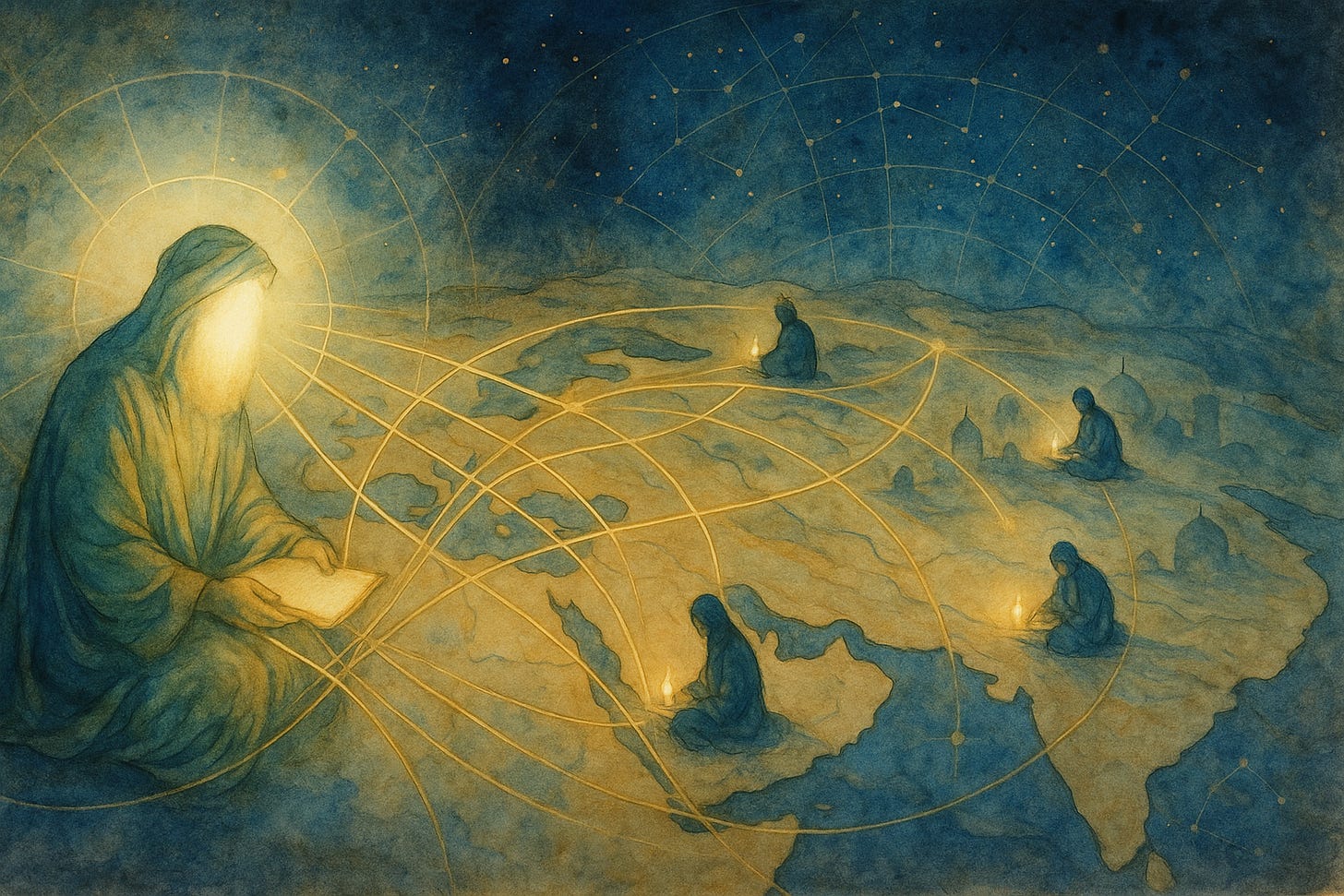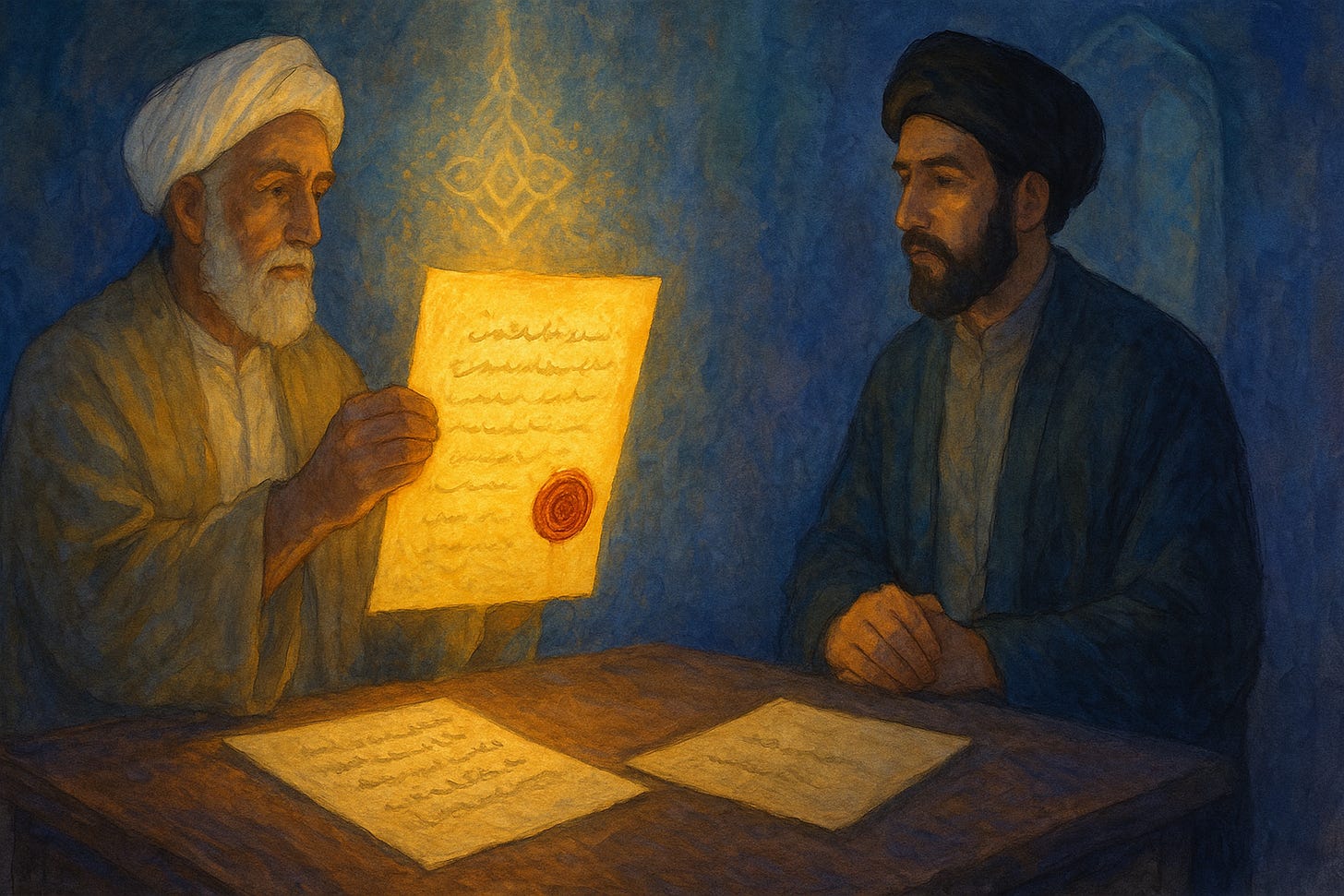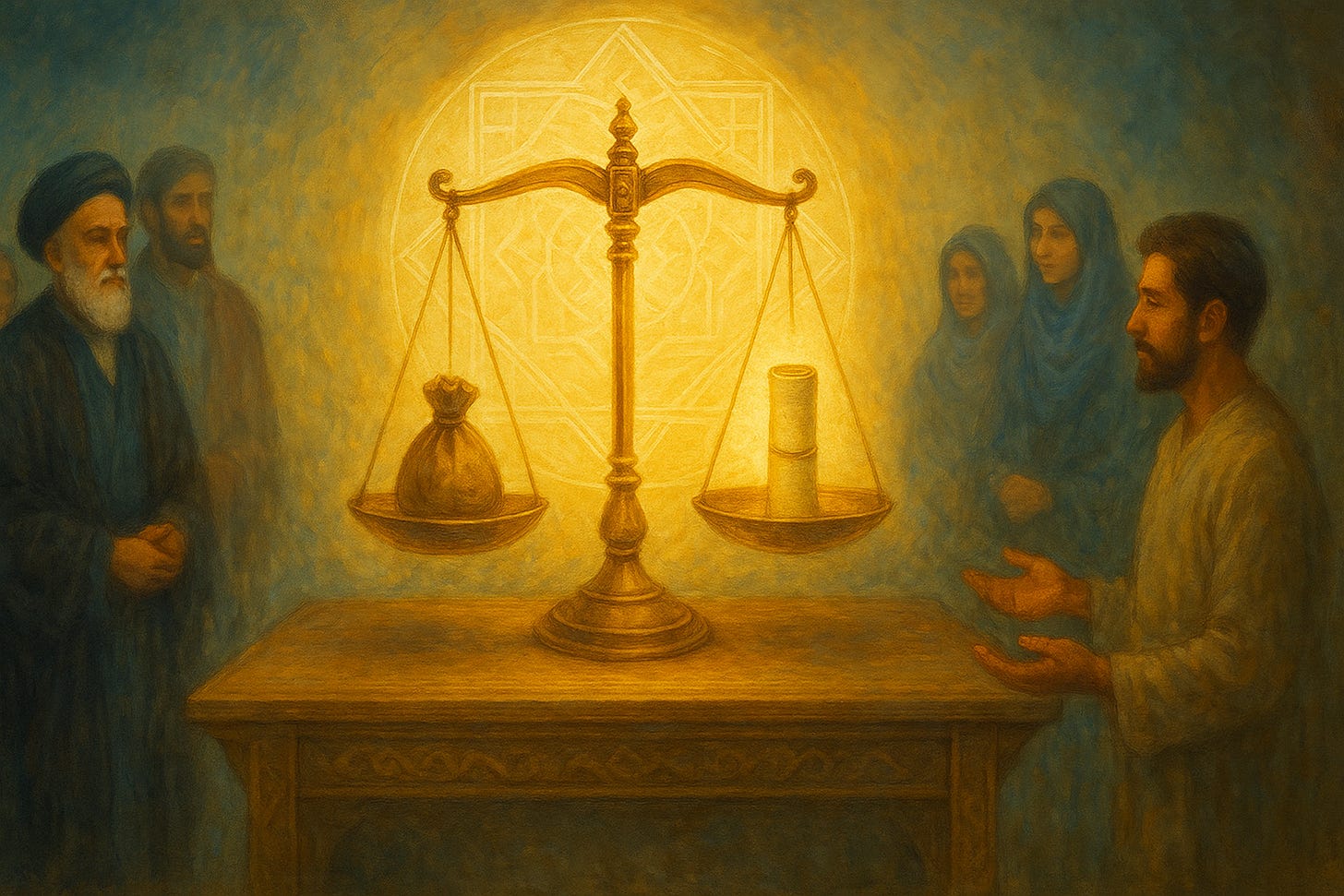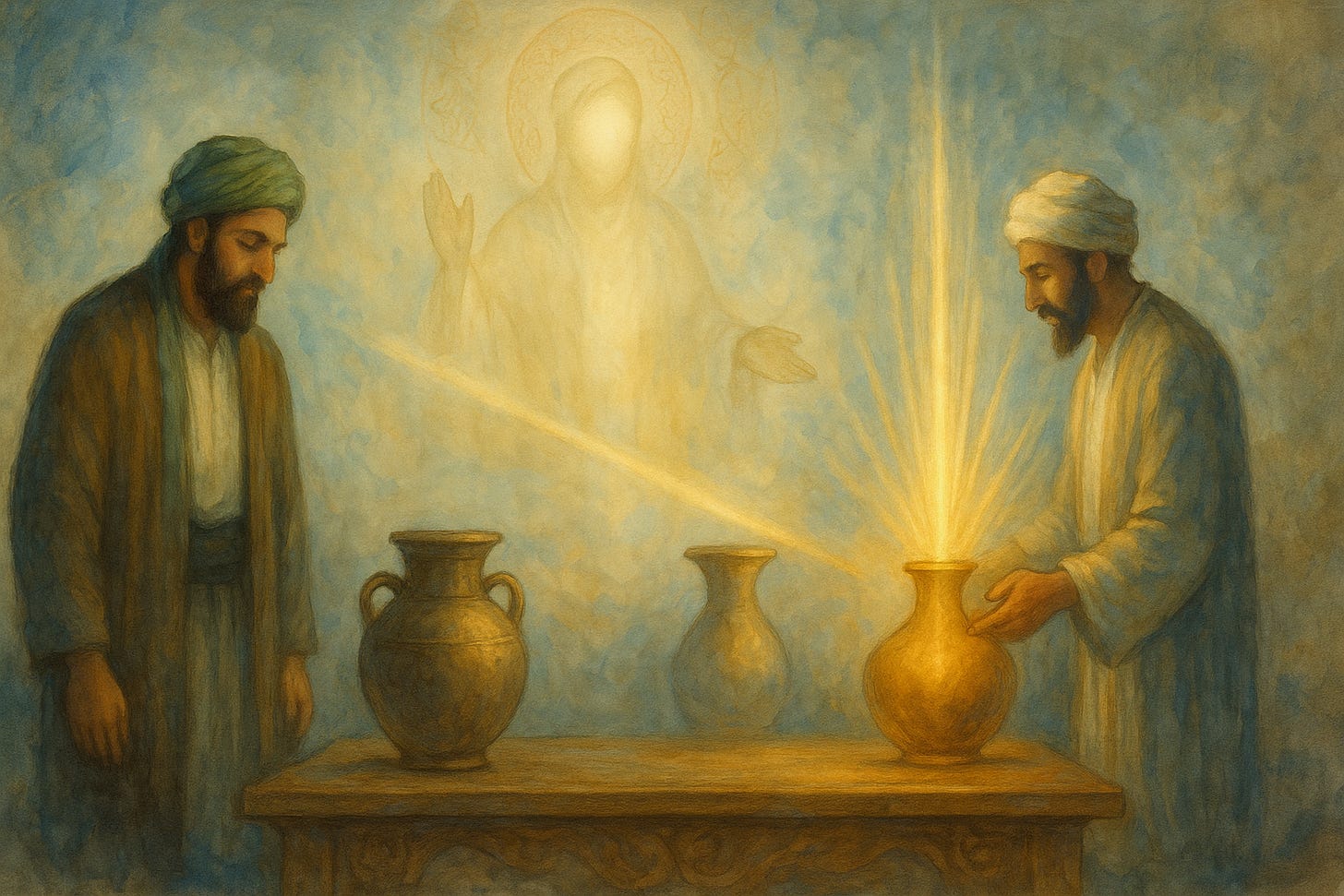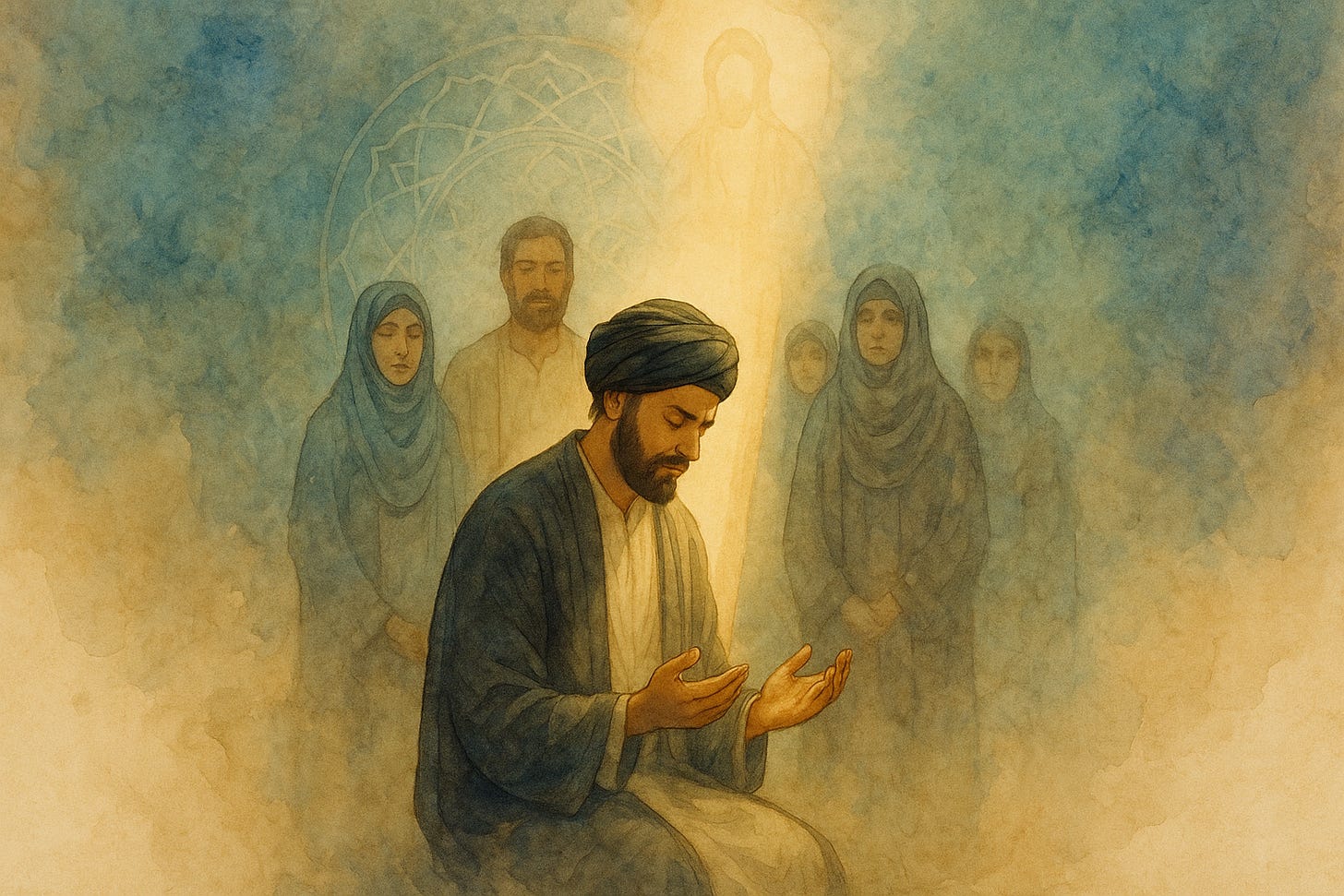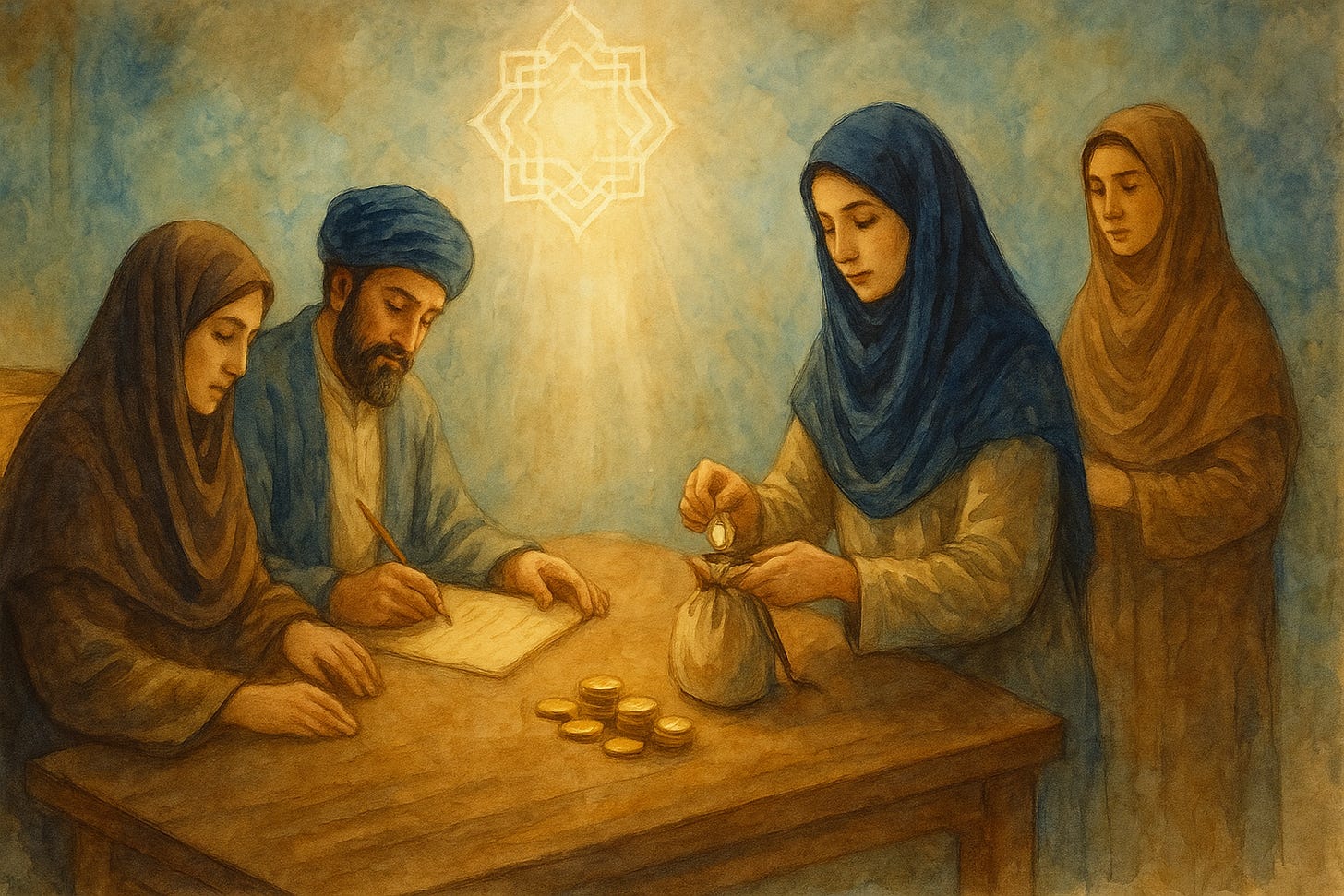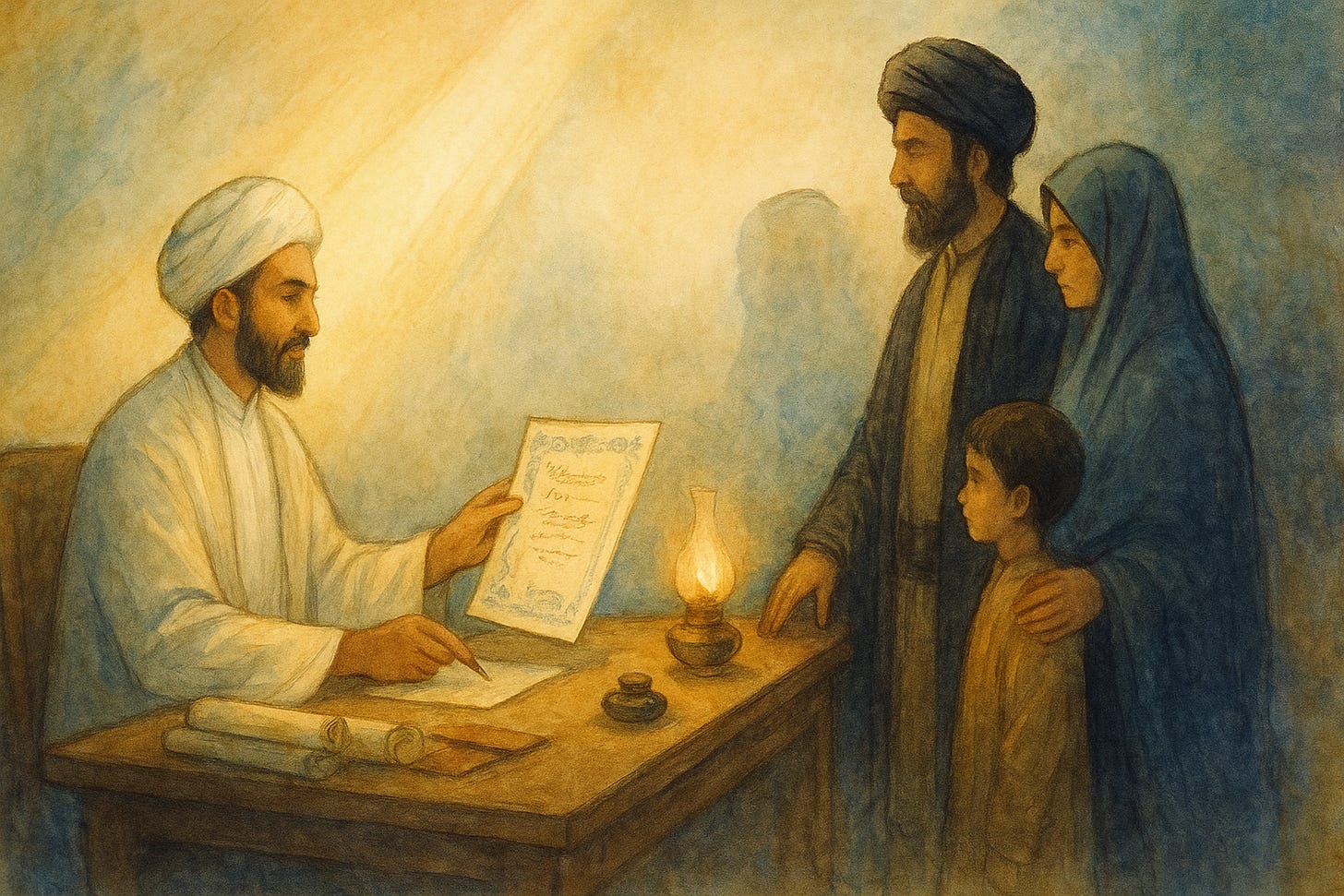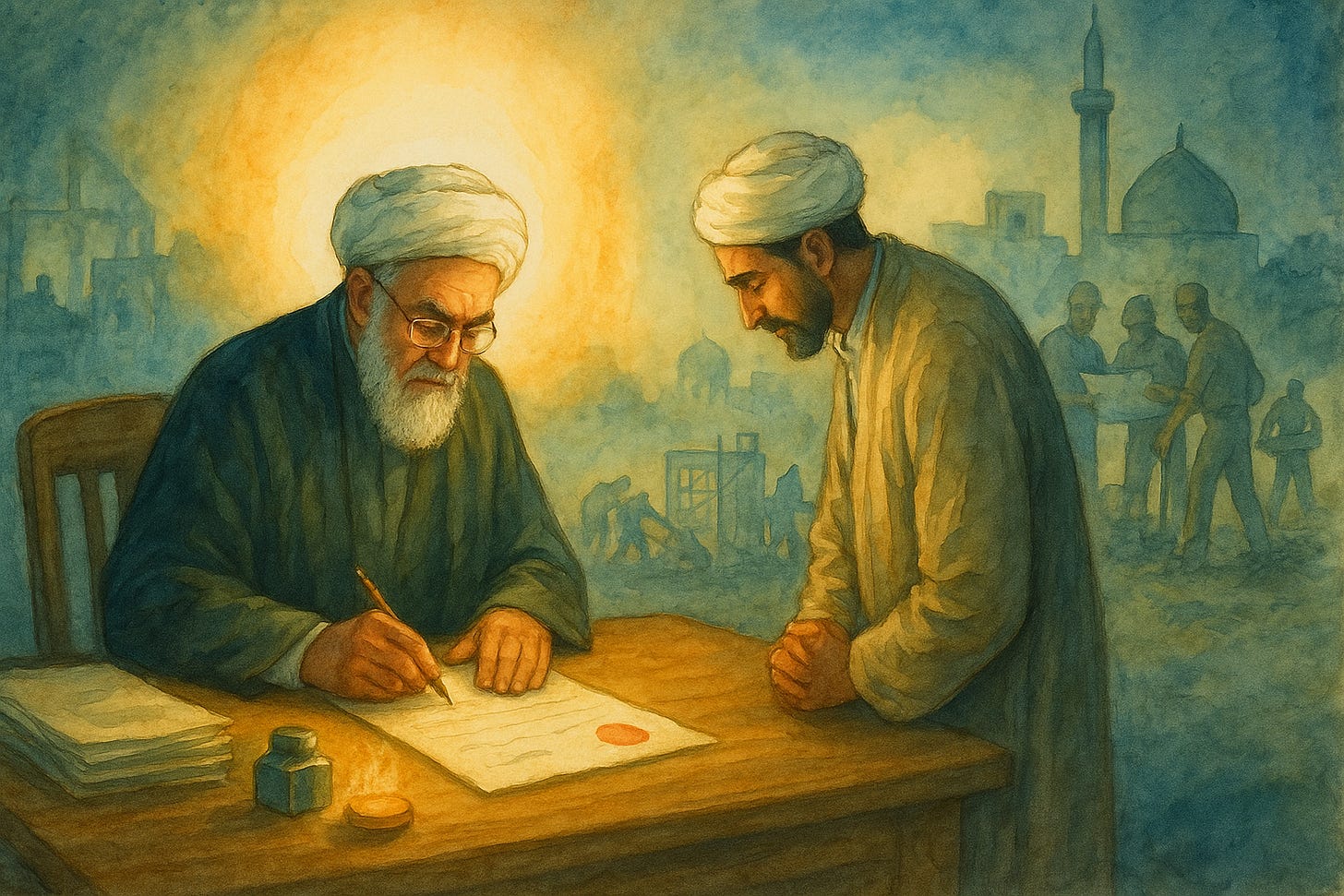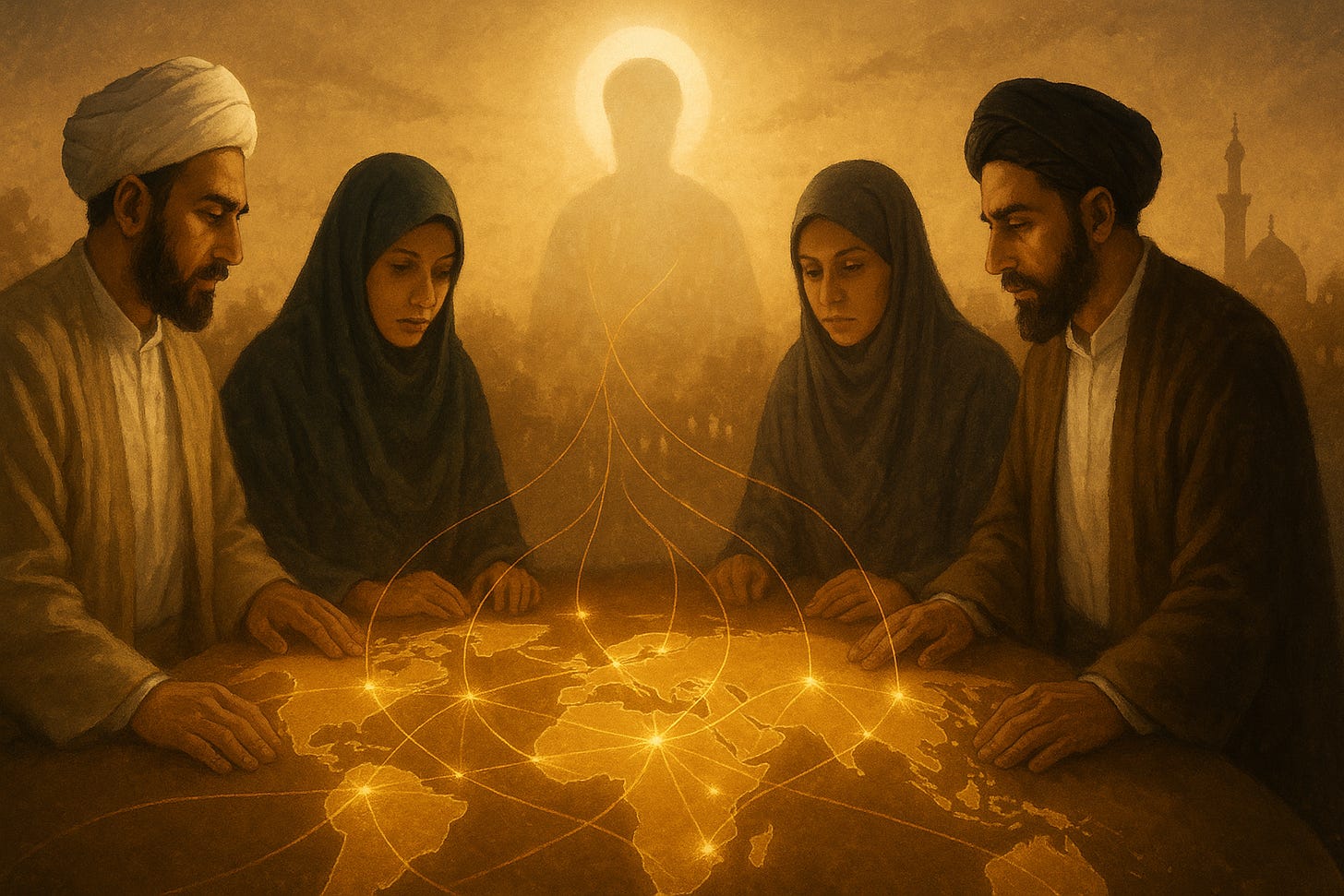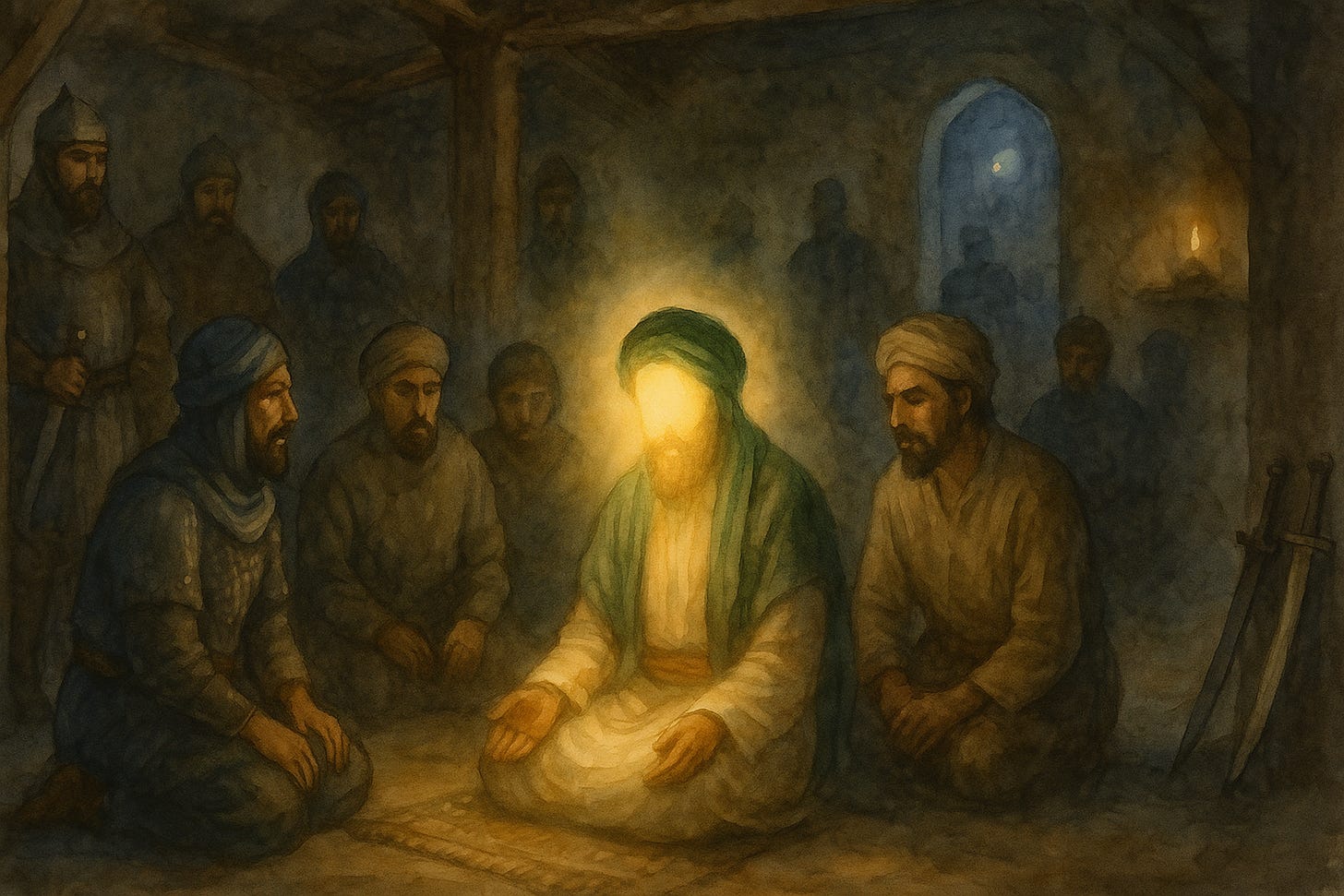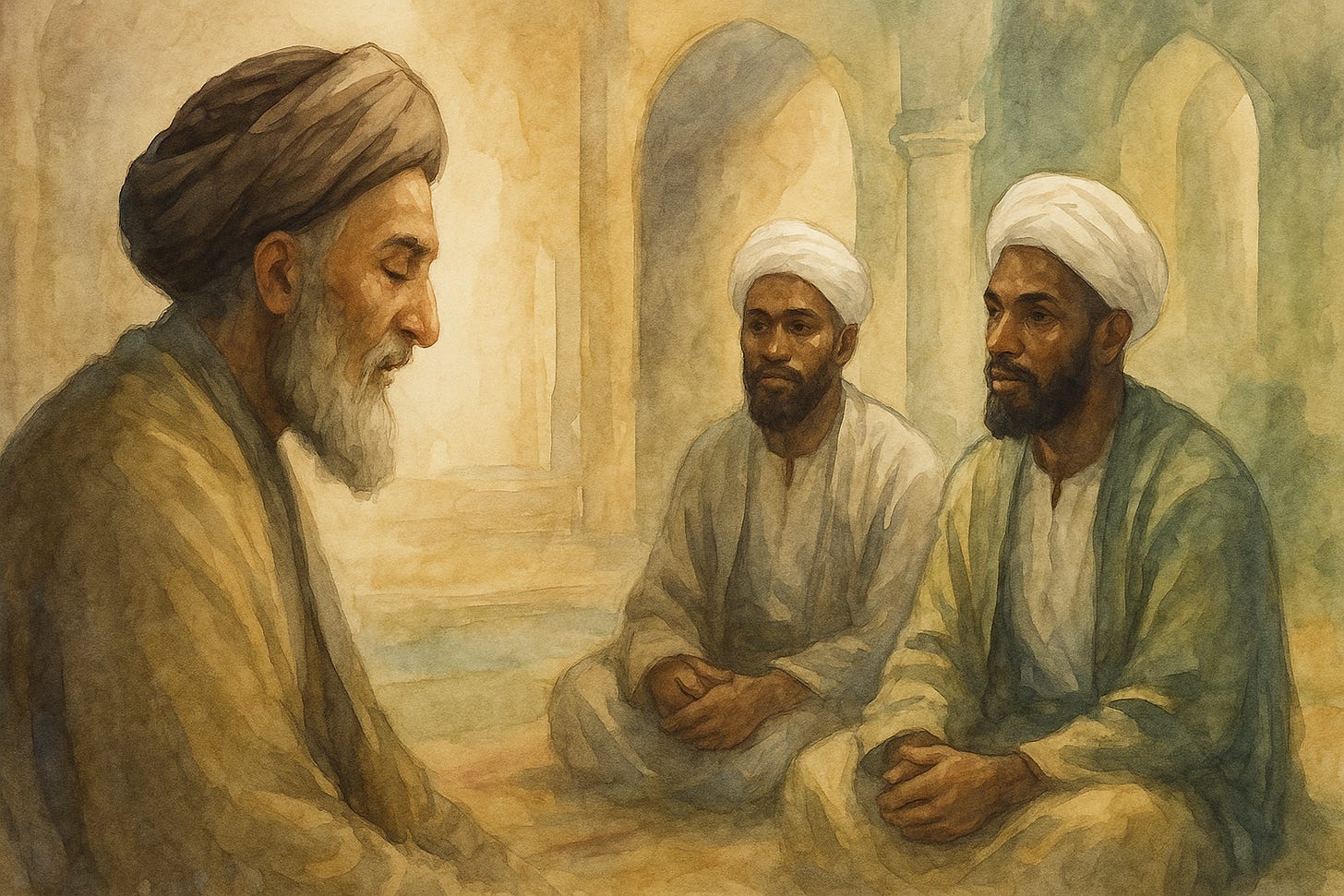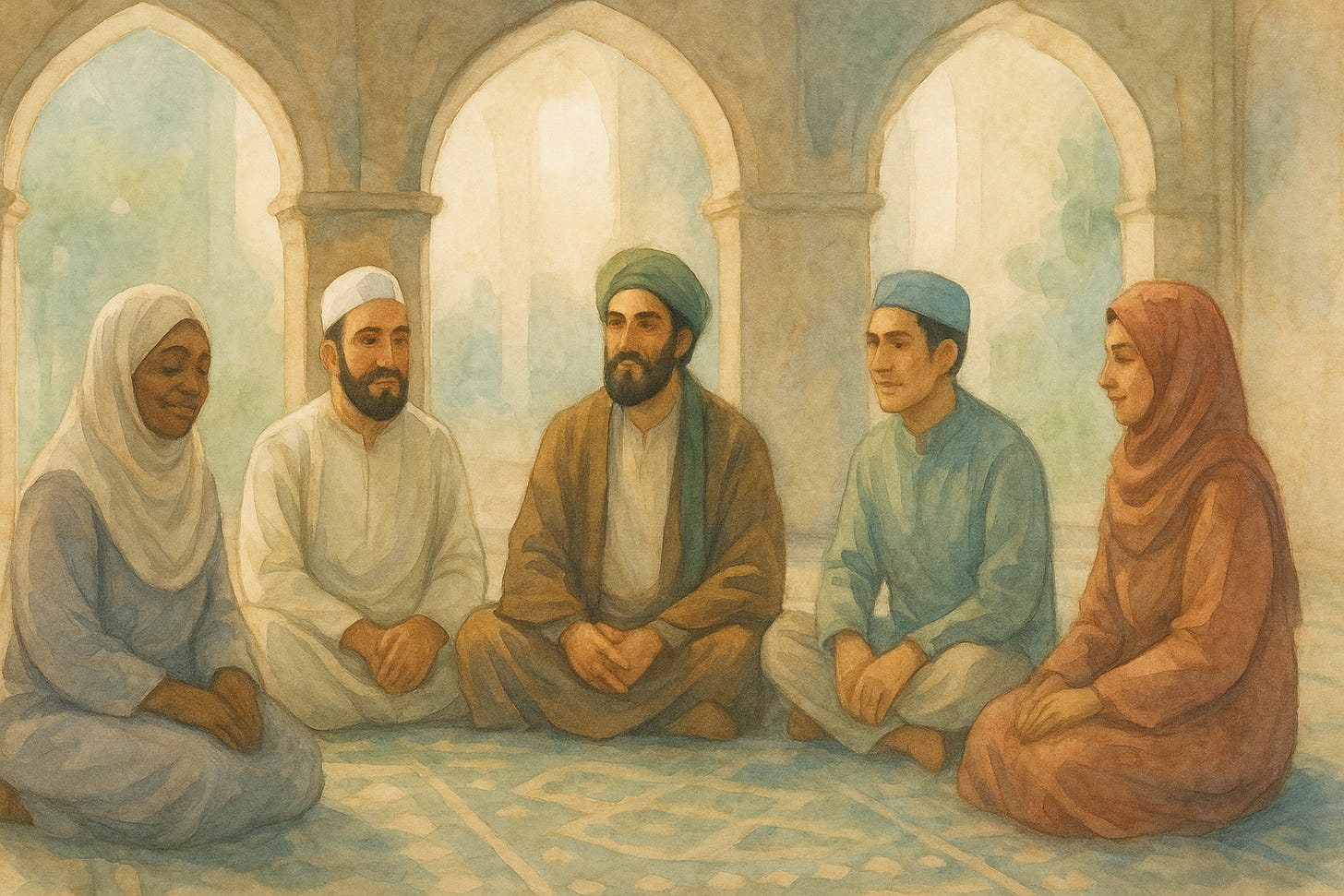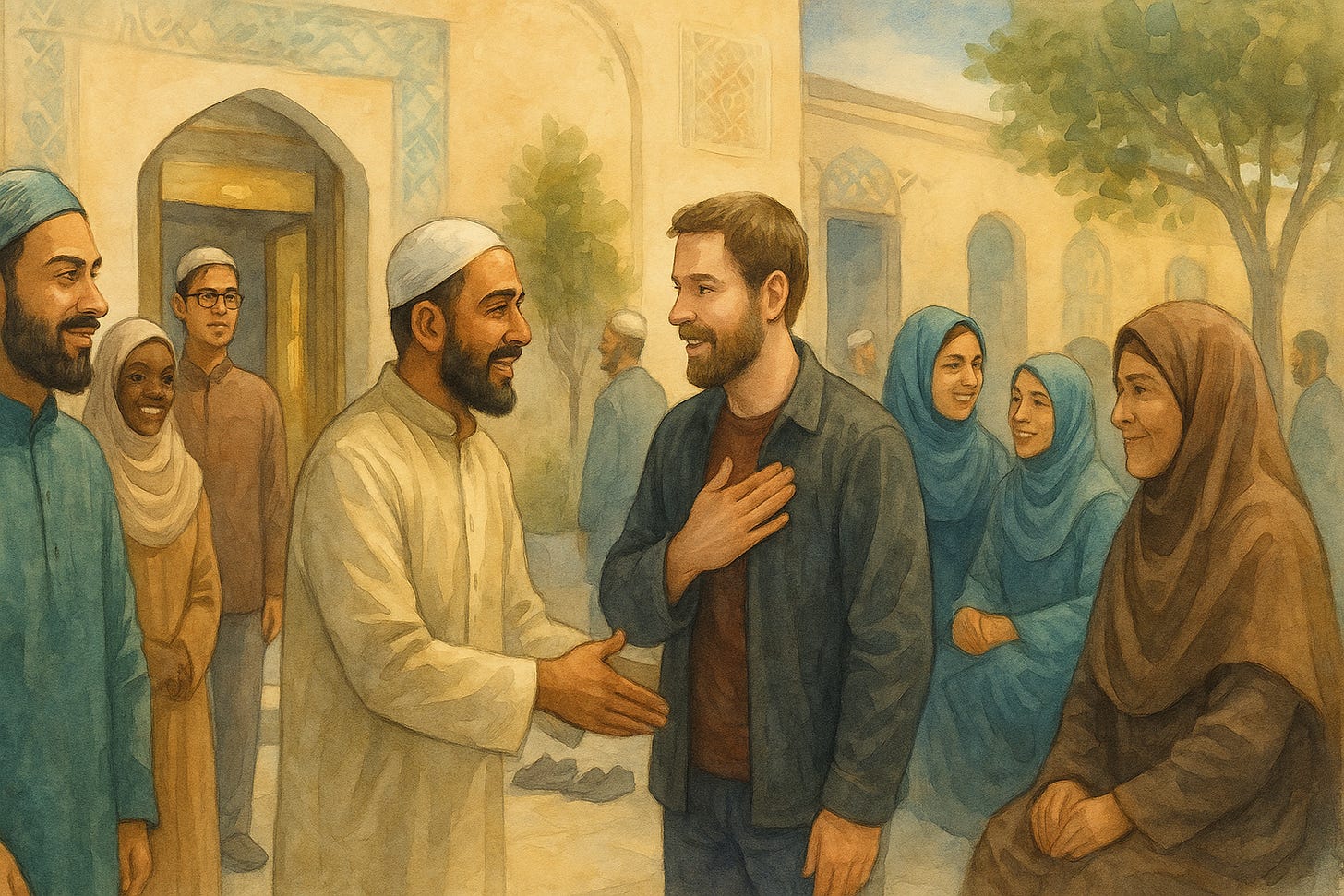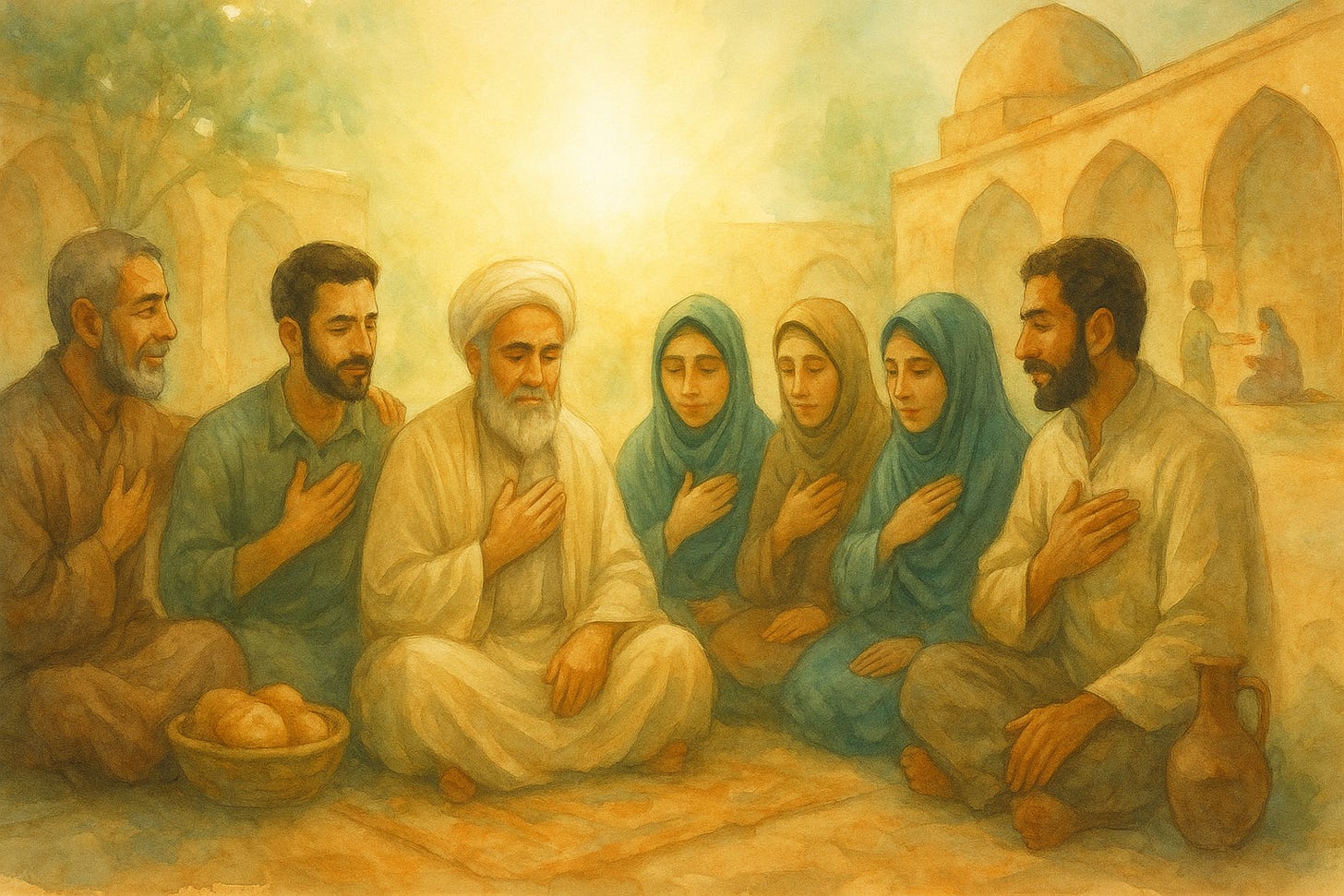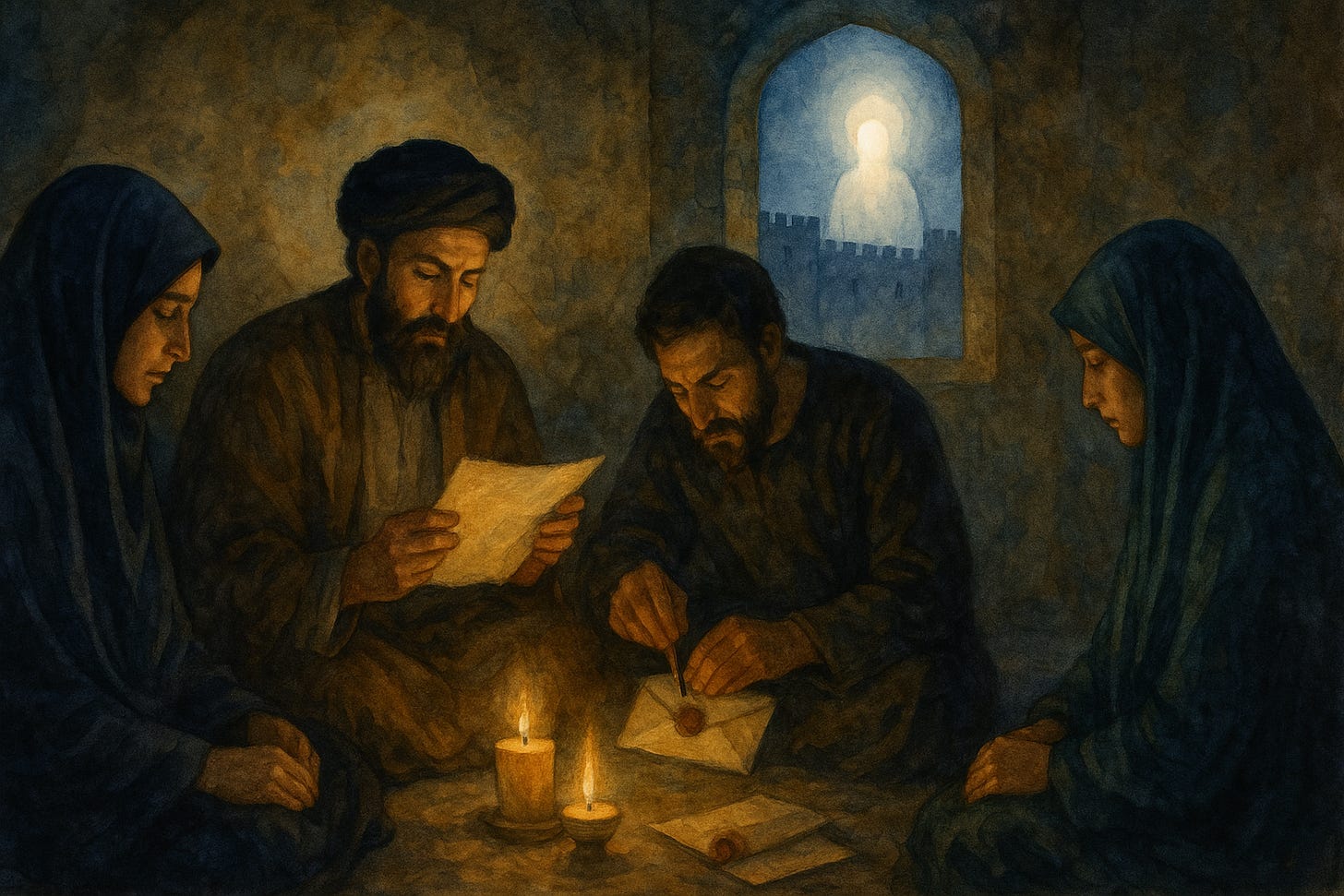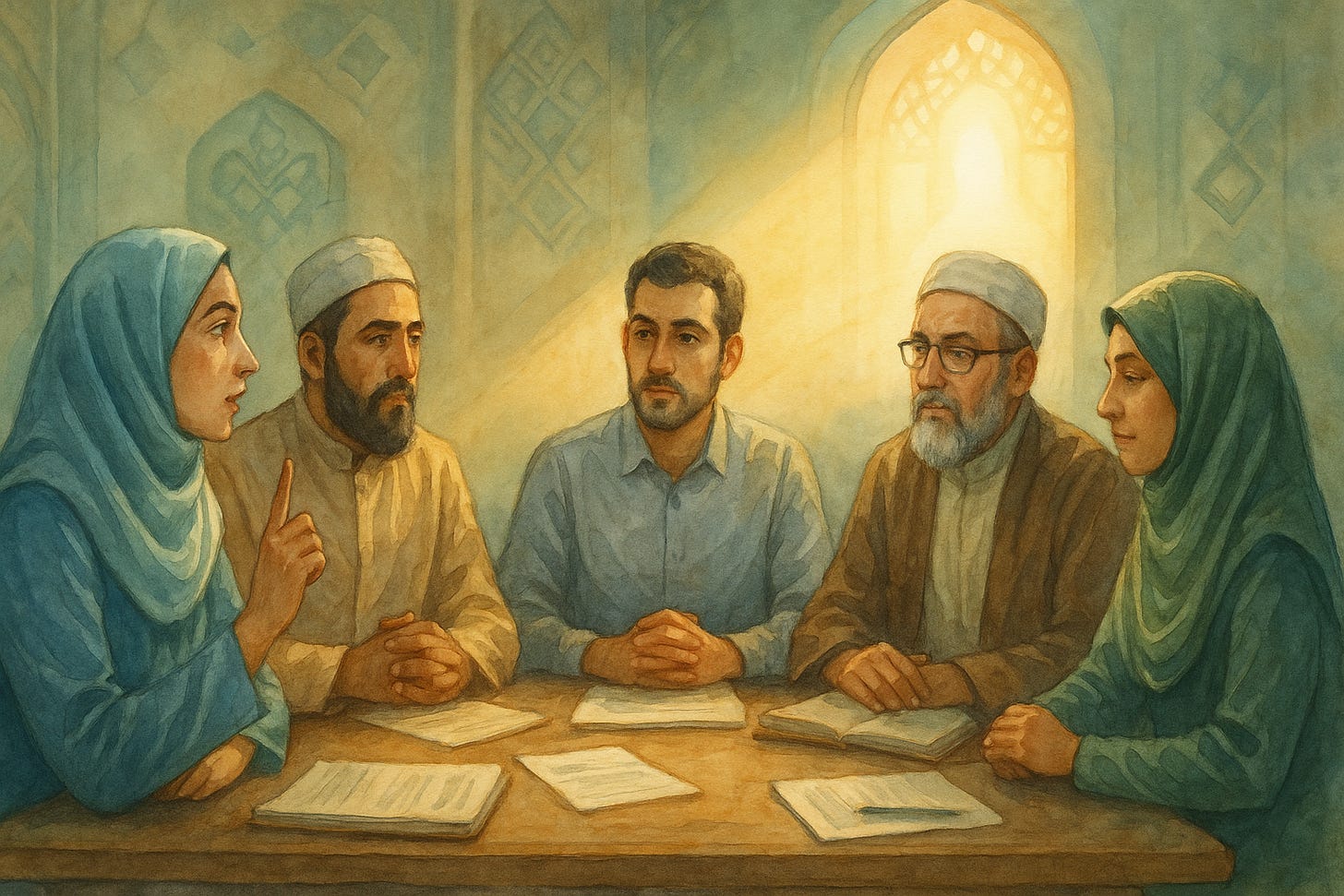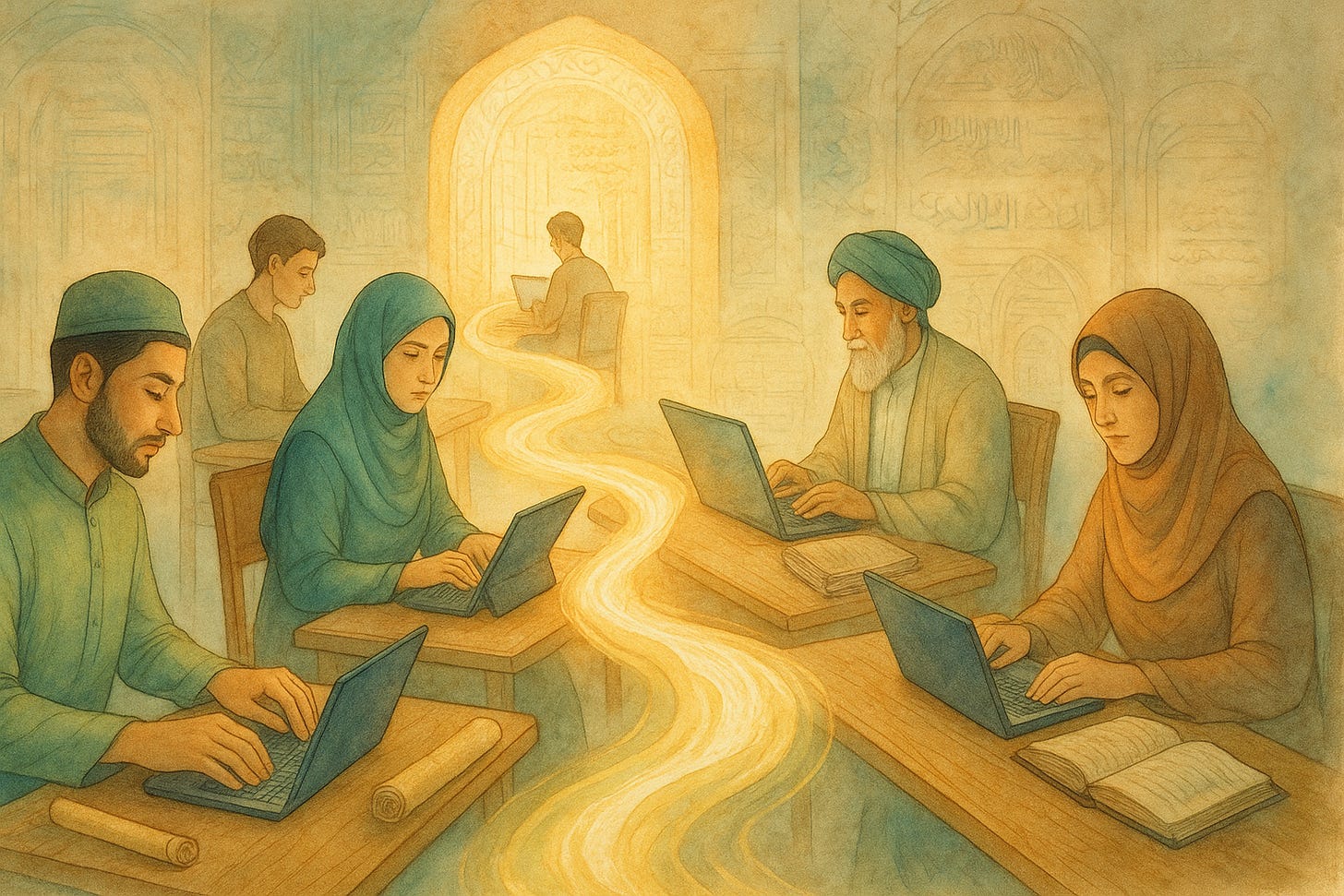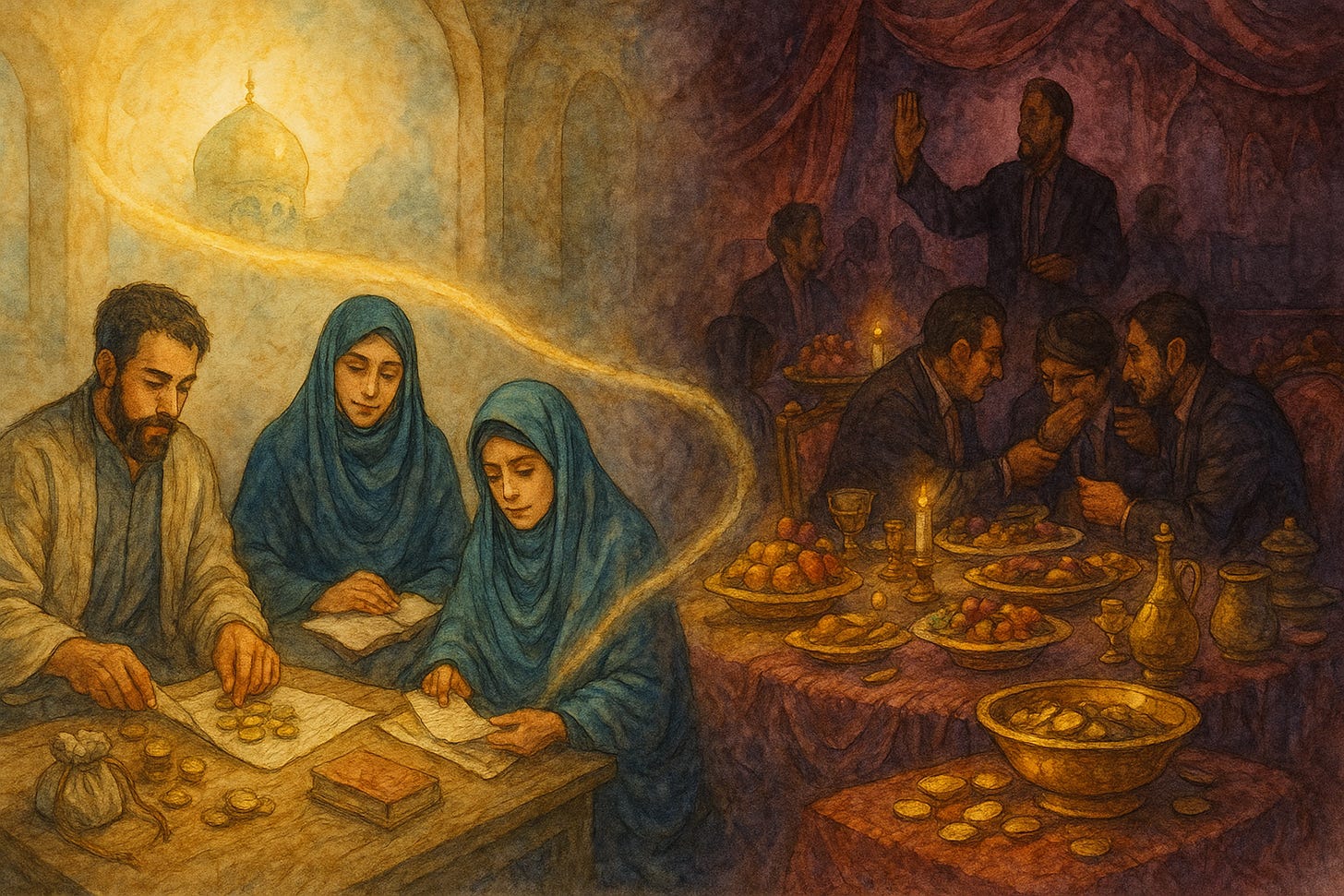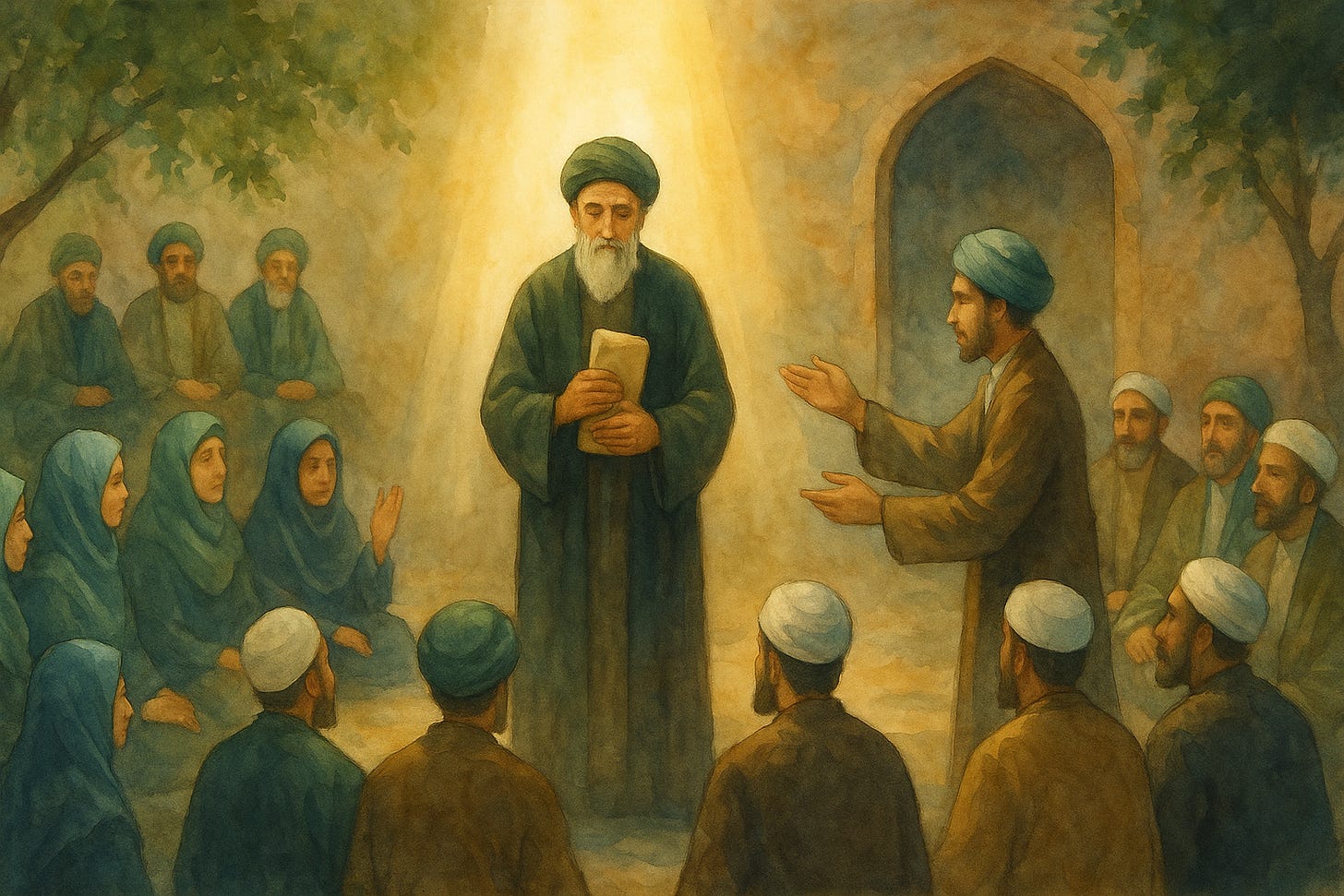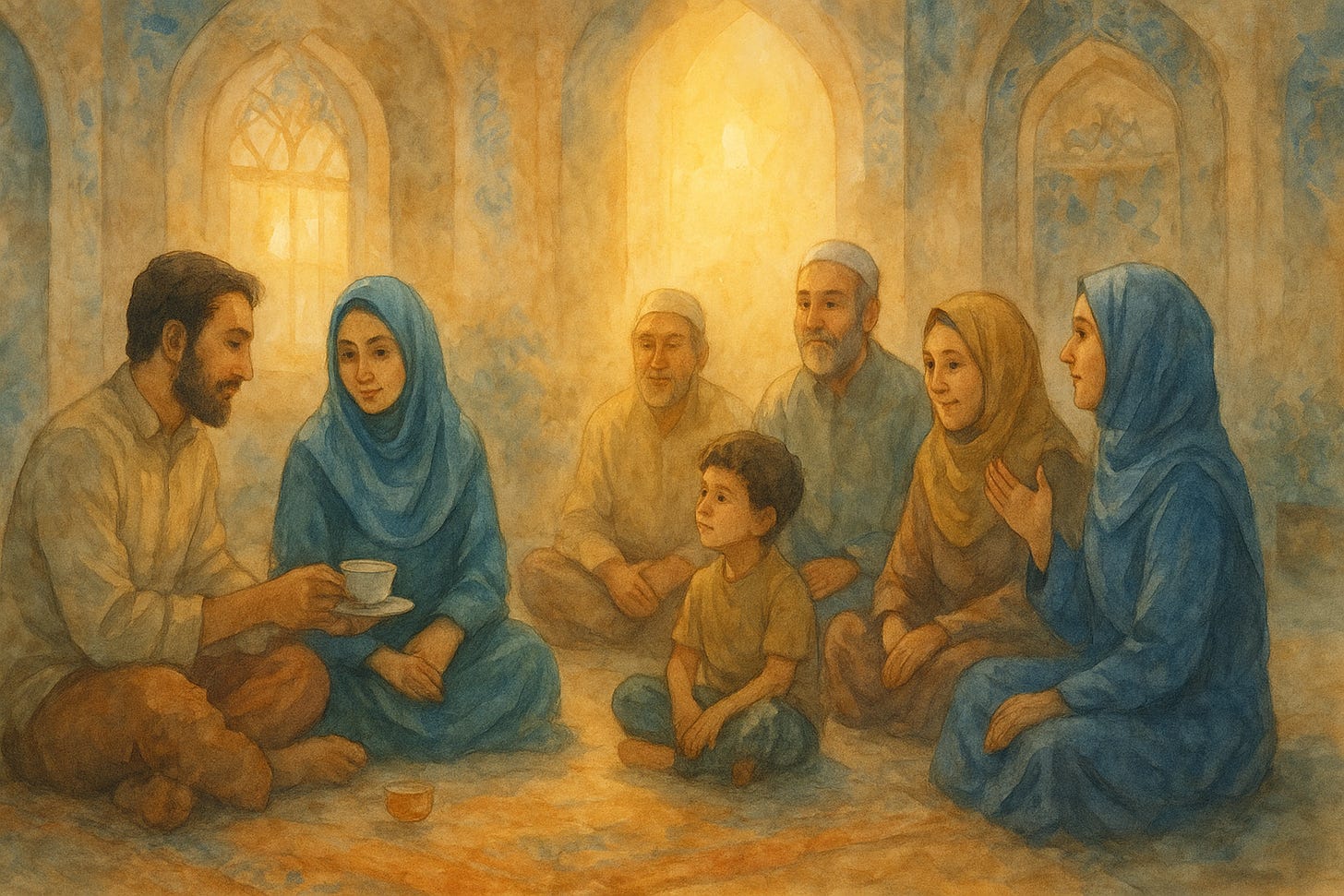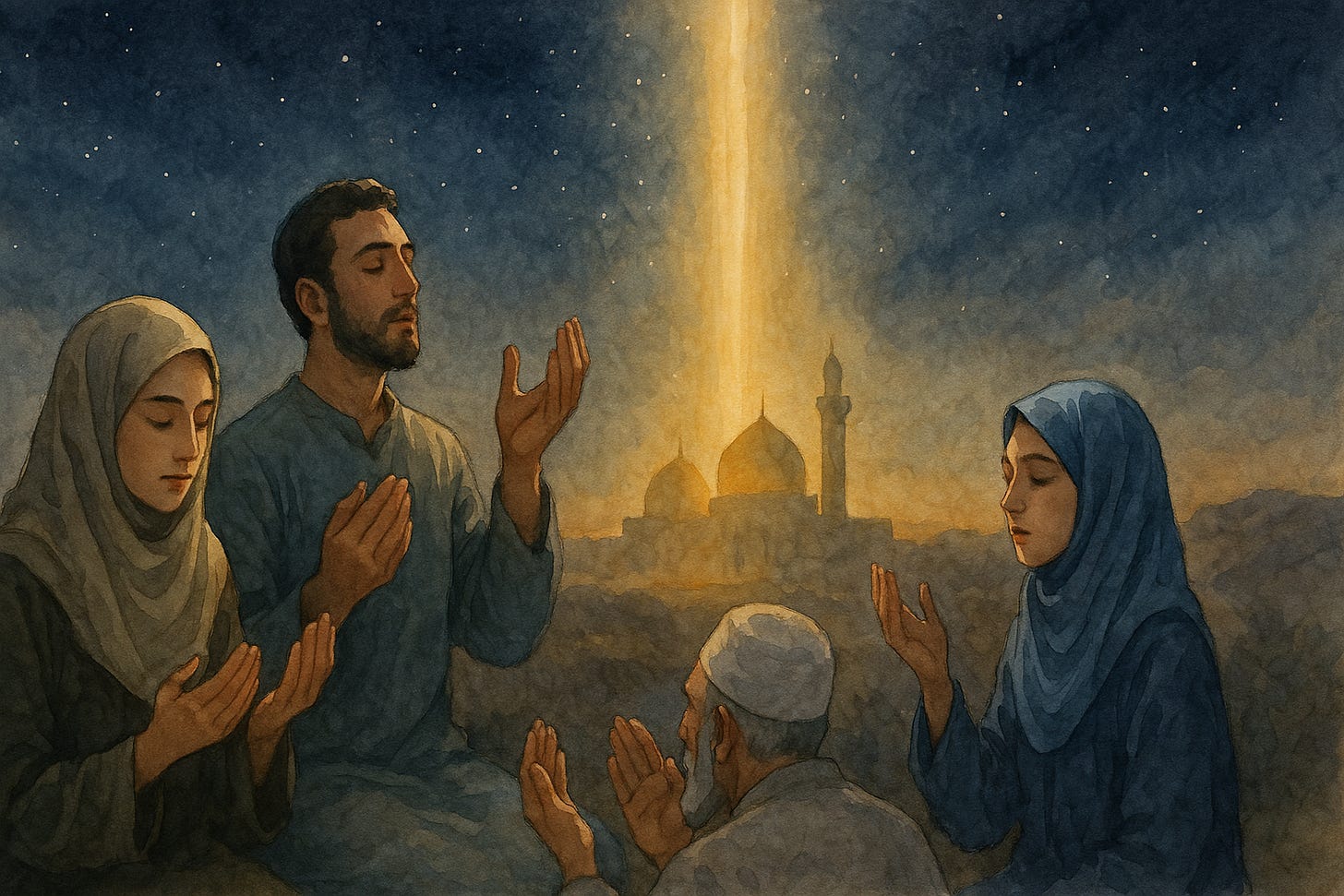[42] Imamah (Leadership) – Imam Ali al-Hadi - Part 2: Networks of Guidance Under Siege
A series of discussions on the teachings of Imam Sadiq (sixth Imam of the Muslims), from the book Misbah ash-Sharia (The Lantern of the Path)
In His Name, the Most High
As we continue our journey with the tenth light of the Imamate, our understanding builds, session upon session, into a single, interconnected tapestry of divine guidance. Our reflection on the life of Imam Ali al-Hadi (peace be upon him) remains rooted in the foundational principle of our study: each gathering illuminates the last, revealing a single, unified mission.
Over our last gathering, we stood in awe before the profound theological foundations of his leadership from within the garrison. We witnessed him defy his imprisonment by delivering the Ziyarah al-Jami’ah al-Kabirah, the timeless “Charter of Wilayah.” We saw him confront the tyrant al-Mutawakkil, transforming a court of debauchery into a pulpit of truth, teaching us the meaning of dignified resistance. We established the theological and moral authority of the Imam.
But that divine charter is only half of the story. A charter requires an infrastructure. A constitution needs a government. A global leadership needs a functional network.
Today, we turn our hearts to the practical genius of the Imam. Having understood the what and the why of his Imamate, we now explore the how. How did he lead a global, clandestine movement from a military prison? How did he guide his followers, collect religious dues, and answer complex questions while under the constant surveillance of the state?
This is the story of the Wikala System—the brilliant and resilient underground network of deputies that the Imam perfected. It is the story of the practical infrastructure that made his leadership possible and, crucially, prepared the Ummah for the greatest trial it would ever face: the impending dawn of the Major Occultation.
With the epic of the Imam’s theological victory fresh in our minds, let us now turn to the story of his Clandestine Infrastructure.
In His most beautiful Name, and with full trust in His support, imploring His assistance and guidance, we proceed…
The previous sessions can be found here:
Video of the Majlis (Sermon/Lecture)
This is the video presentation of this write-up as a Majlis (part of the Truth Promoters Weekly Wednesday Majlis Program)
Audio of the Majlis (Sermon/Lecture)
This is the audio presentation of this write-up as a Majlis (part of the Truth Promoters Weekly Wednesday Majlis Program)
Recap
The Charter of Wilayah & The Light in the Garrison
In our last session, we had the profound honour of beginning our journey with the tenth Imam, Ali ibn Muhammad al-Hadi (peace be upon him). We witnessed how the mantle of Imamate passed from father to son, and how the eight-year-old Imam inherited not only his father’s divine knowledge but also his struggle against a tyrannical regime.
Our reflection on his life unfolded across three core themes:
The Garrison and the Divine Counter-Plot: We first traced the Imam’s forced exile from the city of his grandfather, Madinah, to the Abbasid military fortress of Samarra. We saw how the caliph al-Mutawakkil—a vicious enemy of the Ahl al-Bayt—sought to “cage” the Imam, severing him from his followers. But we learned that this was a divine makr (counter-plot), as explained by Allamah Tabataba’i. The caliph’s physical prison had the unintended consequence of forcing the Shia community to perfect the very clandestine, global network of deputies (Wikala) that would be essential for surviving the coming Occultation.
The Charter of Wilayah: From within that very prison, the Imam delivered his theological masterpiece: Ziyarah al-Jami’ah al-Kabirah. We explored how this “comprehensive charter” is nothing less than the constitution of Imamology. We drew on the insights of scholars like Ayatullah Bahjat and Ayatullah Jawadi-Amoli to understand its profound authority. We also clarified how its lofty descriptions of the Imams are not shirk, but the very essence of Tawhid—as they are the divinely-appointed gates, the “locations of the cognition of God,” through whom a pure, uncorrupted monotheism is known.
Dignified Resistance in a Palace of Wine: Finally, we witnessed the Imam’s supreme moral victory in the caliph’s court. When summoned to a debauched gathering and ordered to drink wine, the Imam firmly refused. Then, when commanded to entertain the tyrant, he instead recited a bone-chilling poem on death that shattered the caliph’s arrogance and brought the entire court to tears. This, we learned, was the pinnacle of Jihad al-Tabyeen (the Jihad of Clarification) and the living embodiment of Imam Husayn’s cry: “How far from us is humiliation!”
We concluded that the Imam’s life was a divine training ground, preparing the Ummah for the Age of Occultation by teaching them to follow his system and his deputies.
In our last session, we focused on the theological charter he provided.
Tonight, God willing, we delve into the practical infrastructure that made his leadership from prison possible: the brilliant and resilient Wikala System itself.
Imamah (Leadership) - Imam Ali al-Hadi: Networks of Guidance Under Siege
Introduction: The Clandestine Infrastructure
Our last reflection concluded with Imam Ali al-Hadi (peace be upon him) firmly imprisoned in the military garrison of Samarra. We witnessed him turn this cage into a pulpit, defying his captors with a display of divine authority. We saw him deliver the Ziyarah al-Jami’ah al-Kabirah, a timeless “Charter of Wilayah” that defined the Imamate for all of history. And we watched him in the tyrant’s debauched court, where he refused the cup of wine and, with a few lines of poetry on death, shattered the caliph’s arrogance, embodying the Husayni cry of “How far from us is humiliation!”
We have seen the moral and theological victory of the Imam. But a profound question remains: how? How does an Imam under 24/7 surveillance, isolated in a military fortress, actually lead a global community? How does he answer complex legal questions from Khurasan, manage religious dues from Qom, and guide followers in Yemen, all while being watched by the state’s spies?
Here, we must move from the popular image of a passive, pious prisoner to the historical reality of a dynamic, clandestine commander. The caliph thought he had “caged” the Imam, but what he had actually done was centralise the command-and-control node of a global, underground network.
This is where we must appreciate the meticulous analysis of scholars like the great martyr Ayatullah Sayyed Muhammad Baqir al-Sadr. He explained that the Imams were not just individuals; they were the heads of a divine project, tasked with building a “conscious base” that could survive any persecution.
كان الأئمة (عليهم السلام)... يمارسون بناء هذه القاعدة الواعية... من خلال شبكة من الوكلاء والارتباطات... وهذا البناء هو الذي شكّل الحصانة الحقيقية للإسلام والمجتمع.
The Imams (peace be upon them)... were building this conscious base... through a network of agents and communications... and this structure is what formed the true immunity for Islam and the community.
— Ayatullah Sayyed Muhammad Baqir al-Sadr, Ahl al-Bayt: Tanawwu’ Adwar wa Wahdat Hadaf (Ahl al-Bayt: Diversity of Roles and Unity of Purpose), Page 72.
This structure was the Wikala (Agency) System. And its perfection under Imam al-Hadi was not just a response to his imprisonment; it was a deliberate, divine preparation for the most critical event in Shia history: the Ghaybah (Occultation).
The Imam’s imprisonment was a “dry run” for the Ummah. He was physically veiled by the caliph’s walls, training the community to function while being physically veiled from their Imam.
The great Shaykh al-Saduq, in his masterpiece Ikmal al-Din (The Perfection of the Religion), explains this philosophy of gradual preparation, noting that the Imams deliberately began to veil themselves more and more to train the Shia to rely on the network of narrators and deputies.
وَلَمْ تَزَلْ شِيعَةُ الْقَائِمِ (ع) فِي سَتْرٍ مِنْ أَمْرِهِمْ... وَالْأَئِمَّةُ (ع) يُعَرِّفُونَهُمْ مَا يَجْرِي بَعْدَهُمْ مِنْ أَمْرِ الْغَيْبَةِ، لِيَعْتَدُّوا لِذَلِكَ وَلَا يَشُكُّوا فِيهِ. وَكَانُوا يُخْبِرُونَ شِيعَتَهُمْ بِالْغَيْبَةِ وَيُوقِفُونَهُمْ عَلَيْهَا لِتَقِلَّ وَحْشَتُهُمْ عِنْدَ وُقُوعِهَا.
And the Shia of the Qa’im (peace be upon him) were always in a state of veiling (satr) regarding their affairs... and the Imams (peace be upon them) would inform them of what would transpire after them regarding the matter of the Occultation, so they could prepare for it and not doubt it. They would inform their Shia of the Occultation and make them aware of it, so that their sense of desolation (wahshah) would be lessened when it occurred.
— Shaykh al-Saduq, Ikmal al-Din wa Itmam al-Ni’mah (The Perfection of the Religion and the Completion of the Grace), Volume 1, Introduction by the Author, Page 20.
This session will explore this brilliant and resilient infrastructure. We will see how the Imam engineered this global network of deputies. We will witness his da’wah to his very own jailers, turning a barracks into a school. And we will study the “protocols of veiling” that he perfected, the very protocols that would allow the community to survive—and thrive—in the Age of Occultation.
This is the story of the Clandestine Network.
Engineering the Wikala: Cables Across the Ummah
The caliph’s plot was simple: by imprisoning the Imam in a military garrison, he would sever the head of the Shia community from its body. But the tyrant’s plan was built on a fatal flaw: he mistook a divine, living organisation for a mere worldly one. He failed to understand that the Imamate does not lead by physical presence alone, but by a spiritual connection and a “Comprehensive Organisational Endeavour.”
This is the term used by Imam Khamenei to describe the brilliant, resilient infrastructure that Imam al-Hadi and his predecessors had perfected.
این سازماندهی و این تشکیلات گستردهی شیعی در همهی اقطار دنیای اسلام، یکی از شگفتیهای تاریخ زندگی ائمه (ع) است... این یک تشکیلات عظیمی است که با این پنهانکاری، با این رازپوشی، با این همه تلاش، اینها را اداره میکردند.
This organisation and this vast Shia infrastructure in all corners of the Islamic world is one of the marvels of the history of the Imams’ lives... It was a magnificent organisation that they administered with such secrecy, with such confidentiality, with such immense effort.
— Imam Khamenei, Insan-e 250 Saleh (The 250-Year-Old Person), Chapter 18, Section on the Clandestine Organisation.
This organisation was the Wikala (Agency) System. It was not just a loose collection of followers, but a formal, sophisticated, and clandestine network of trusted local deputies, or wukala’ (agents). While the Imam was under siege in Samarra, this network became his hands, his ears, and his voice to the world.
Its functions were precise and vital:
Clandestine Finances: The wukala’ were responsible for the secret collection and routing of khums (the one-fifth tithe) and other religious dues, ensuring the community’s financial independence and its ability to support its scholars and its poor.
Scholarly Answers: They were the secure pipeline for conveying complex legal and theological questions (fiqh) from distant communities back to the Imam in Samarra.
Authentic Communication: They were entrusted with disseminating the Imam’s official signed answers and commands, known as tawqi’at. This was the Imam’s ‘in-box’ and ‘out-box’ to the world.
Conflict Mediation: They acted as the Imam’s official representatives, empowered to resolve local disputes, settle estates, and maintain social cohesion.
This was a continent-spanning operation, with major nodes in the key Shia centres of Qom, Rey (near modern Tehran), Baghdad, Khurasan, Samarqand, and Yemen.
The great historian Shaykh al-Tusi, in his Kitab al-Ghaybah (Book of Occultation), doesn’t just mention this network; he meticulously documents its members.
His work contains a vital section titled “A Mention of the Praiseworthy Deputies” (Dhikr al-Wukala’ al-Mamduhin), where he provides specific, verified entries for these agents, proving the network’s formal structure. A prime example is his entry for one of Imam al-Hadi’s deputies:
عَلِيُّ بْنُ جَعْفَرٍ الْهَمَّانِيُّ، وَكِيلُ أَبِي الْحَسَنِ (ع)، كَانَ رَجُلًا مِنْ أَهْلِ هَمِينْيَا مِنْ قُرَى سَوَادِ بَغْدَادَ، ثِقَةً فِي حَدِيثِهِ، وَاضِحاً فِي أَمْرِهِ. وَكَانَ وَكِيلًا لِأَبِي الْحَسَنِ (ع) وَرَدَتْ فِي مَدْحِهِ أَخْبَارٌ.
Ali ibn Ja’far al-Hammani, the deputy of Abu al-Hasan [Imam al-Hadi] (peace be upon him). He was a man from the people of Haminiyya, a village in the environs of Baghdad. He was reliable in his hadith (thiqa) and clear in his affair (i.e., his faith). He was a deputy for Abu al-Hasan (peace be upon him), and narrations have been transmitted in his praise.
— Shaykh al-Tusi, Kitab al-Ghaybah (The Book of Occultation), Section on the Praiseworthy Deputies, Page 212.
This single entry is a perfect illustration of the entire Wikala system in action. Shaykh al-Tusi gives us the agent’s name (Ali ibn Ja’far), his location (a village near Baghdad), his theological reliability (thiqa), and his official function (a wakil in whose praise narrations exist).
This is the ‘Comprehensive Organisational Endeavour’ in practice, and its meticulous recording by Shaykh al-Tusi is what allows us to understand its structure today.
This system is the direct blueprint for our modern religious organisation.
The wakil was a trusted treasurer, a scholar-liaison, and a community mediator, all in one. And most importantly, this system was the direct prototype for the Four Special Deputies who would later guide the Ummah during the Minor Occultation.
The great martyr Ayatullah Sayyed Muhammad Baqir al-Sadr, in his brilliant analysis of the Imams’ lives, explained that their goal was never just to be pious individuals, but to build a “conscious base” that could survive and function.
كان الأئمة (عليهم السلام)... يمارسون بناء هذه القاعدة الواعية... من خلال شبكة من الوكلاء والارتباطات... وهذا البناء هو الذي شكّل الحصانة الحقيقية للإسلام والمجتمع.
The Imams (peace be upon them)... were building this conscious base... through a network of agents and communications... and this structure is what formed the true immunity for Islam and the community.
— Ayatollah Sayyed Muhammad Baqir al-Sadr, Ahl al-Bayt: Tanawwu’ Adwar wa Wahdat Hadaf (Ahl al-Bayt: Diversity of Roles and Unity of Purpose), Page 72.
Call to Clarify: Amanah (Trust) is the Artery of the Ummah
The Wikala system was built on one single, non-negotiable principle: Amanah (Trust).
The entire global network would collapse with a single act of betrayal or corruption.
This lesson is eternal, and it leads to the most critical clarifications for our communities today, as this divine system of social welfare and empowerment has, in some quarters, been corrupted, turning a mechanism for alleviating poverty into a cash cow for the unscrupulous.
Our Wikala today is our community governance—our centres, our charities, and our mosques.
The lesson from Imam al-Hadi is that this trust is not just assumed; it must be authenticated, transparently managed, and meticulously accounted for.
The Indispensable Principle of Ijazah (Permission)
First, no person or centre has any authority to collect religious dues like Khums or Zakat on behalf of a Marja’ without his explicit, verifiable permission (ijazah).
The Imams themselves were strict about this, sending letters (tawqi’at) to authenticate their true agents and warn against impostors.
Today, this principle is an absolute in Shia jurisprudence.
Here is the ruling from Imam Khamenei:
س 1015: آیا طلاب علوم دینیه و وعاظ، مجازند حقوق شرعیه (مانند خمس) را از مردم بگیرند، بدون این که از مراجع اجازه داشته باشند؟
ج: جایز نیست طلاب علوم دینیه و وعاظ، حقوق شرعیه را از مردم بگیرند و دریافت کنند، مگر بعد از کسب اجازه از مرجعی که مکلّف، مقلّد اوست و می خواهد حقوق شرعیه خود را به او بپردازد.
Question: Is it permissible for seminary students or preachers to take religious dues (like Khums) from the people without permission from a Marja’?
Answer: It is not permissible for seminary students or preachers to take or receive religious dues from the people, except after seeking and obtaining permission from the Marja’ whom the mukallaf (one who is obligated) follows and to whom he wishes to pay his religious dues.
— Imam Khamenei, Risaleh-ye Ajwibat al-Istifta’at (Answers to Inquiries), Question #1015
And here is a parallel, clear-cut ruling from Ayatullah Sayyed Ali al-Sistani:
السؤال: هل يجوز إعطاء سهم الإمام (عليه السلام) لأي شخص معمم؟
الجواب: لا يجوز تسليم سهم الإمام (عليه السلام) إلا للمرجع أو وكيله المأذون منه في ذلك.
Question: Is it permissible to give Sehm-e-Imam to any person who wears the turban (i.e., is a cleric)?
Answer: It is not permissible to hand over Sehm-e-Imam except to the Marja’ or his agent (wakil) who possesses permission (ma’dhun) from him for that purpose.
— Ayatullah Sayyed Ali al-Sistani, Official Website, Questions & Answers on Khums, Question #18.
The Fallacy of the “Verbal Ijazah“
This ijazah must be a clear, verifiable proof.
The responsibility lies not just with the agent to be honest, but with the Khums-payer to do their due diligence.
This is not a matter of personal opinion but a bedrock principle of our fiqh.
The entire argument rests on a foundational, universally accepted legal maxim established by the Holy Prophet (peace and blessings be upon him and his family):
الْبَيِّنَةُ عَلَى الْمُدَّعِي
The burden of proof (al-bayyinah) is on the one who claims...
— Prophetic Maxim, cited as a foundational legal maxim (Qa’idah Fiqhiyyah) by all major jurists, including Shaykh al-Tusi in Al-Mabsut.
A person’s statement, “I have a verbal ijazah,” is a claim (da’wa). It requires bayyinah (clear evidence).
A written, authenticated document from the Marja’s office is that evidence; a verbal claim is not.
This principle of requiring authentication is the bedrock of our entire religious tradition.
A fatwa (ruling) itself is not considered binding if it is merely heard verbally. The muqallid (follower) has a duty to verify it.
As Ayatullah Sistani’s Minhaj states:
مسألة ٨: تثبت فتوى المجتهد... بالنقل الموثوق به، كنقل عدلين، أو ثقة يطمأن بقوله، أو بوجودها في رسالته العملية المأمونة من الغلط.
Issue 8: The fatwa of the Mujtahid is established... by a reliable transmission, such as the transmission of two just persons, or a reliable person (thiqa) whose word brings certainty, or by finding it in his book of practical rulings (Risalah) which is secure from error.
— Ayatullah Sayyed Ali al-Sistani, Minhaj al-Salihin, Volume 1, Issue #8.
The “verbal fatwa“ holds no weight until it is verified through a reliable, authenticated source—like the Marja’s official book.
When this exact same standard of proof is applied to the ijazah for Khums, the ruling is even more explicit.
The Marja’s office is asked how one can be sure that a person is a legitimate agent.
The answer is not “trust their verbal claim.” The answer is to demand proof.
السؤال: كيف يمكن التأكد من وكلاء المرجع؟
الجواب: لا بد من إحراز الوكالة بالطرق المعتبرة شرعاً، كالاختبار أو شهادة الثقات الذين يثق بهم، أو الاطلاع على إجازته الخطية المختومة بختم مكتبه.
Question: How is it possible to be certain of the Marja’s agents?
Answer: One must ascertain the agency (wikalah) through legally valid methods, such as personal knowledge, or the testimony of reliable persons (thiqat) whom one trusts, or by seeing his written permission (ijazatihi al-khattiyyah) stamped with the seal of his office.
— Ayatullah Sayyed Ali al-Sistani, Official Website, Questions & Answers on Khums.
This ruling is the final word. It confirms that the standard of proof for an ijazah is a “written permission stamped with the seal of his office.”
A “verbal ijazah“ has no verifiable standing for the Khums-payer.
But in our age of deepfakes and sophisticated forgery, this raises a second, even more critical question: how do we authenticate the written ijazah itself?
The danger is not theoretical.
We have seen cases where overzealous individuals, wanting to promote a program, have used Photoshop to manufacture a fatwa from a Marja’, declaring their event wajib (obligatory).
This forgery was then spread on social media, causing confusion and panic among sincere believers in distant villages, who felt a religious duty to attend an event thousands of miles away.
This highlights a core principle of jurisprudence: the fiqh must cater to and protect the most vulnerable in society, not just the most discerning.
A system that is easily forged is a failed system, as it creates immense hardship (haraj) for the weakest.
This problem of charlatans and impostors is not new.
The Imams themselves were forced to deal with it constantly.
The Wikala system was plagued by false agents, and the Imams had to issue explicit, verifiable letters (tawqi’at) to authenticate their true representatives and denounce the fakes.
A clear example is this tawqi’ from Imam al-Hadi himself, warning his followers to shun an impostor:
رَوَى الْحُسَيْنُ بْنُ مُحَمَّدٍ الْأَشْعَرِيُّ... أَنَّهُ خَرَجَ إِلَيْهِمْ مِنْ أَبِي الْحَسَنِ (ع) تَوْقِيعٌ: ...لَا تَأْتُوا فَارِسَ بْنَ حَاتِمٍ... وَ قَدْ أَعْلَمْتُكُمْ، فَاجْتَنِبُوهُ، وَ لَعَنَهُ اللَّهُ...
It is narrated... that a tawqi’ (signed letter) came out to them from Abu al-Hasan [Imam al-Hadi]: “...Do not go to Faris ibn Hatim... I have informed you, so shun him, and may God curse him...”
— Shaykh al-Tusi, Kitab al-Ghaybah (The Book of Occultation), Section on the Denounced Deputies, Page 218.
The Imam used the most secure technology of his time: a verified, hand-delivered letter authenticated by trusted couriers.
Today, our duty is to demand the same level of verifiable trust.
We live in an age where a secure, immutable ledger—perhaps something based on a blockchain or a simple QR code on a letter that links to a secure page on the Marja’s official website—is not a luxury for authenticating fatawa and ijazat, but an absolute necessity.
Any centre professing to collect Khums must be able to produce this valid, current, and verifiable written proof.
To operate without it, or to refuse to show it, is to break the first and most sacred link in the chain of amanah.
The Sacred Balance of Khums: A System of Dignity, Not Superiority
Before we discuss the how of Khums management, we must understand the why.
The system of Khums is a divine mechanism of social balance and dignity.
However, the designation of one-half of it as Sehm-e-Sadaat (The Share of the Sayyeds) has become a source of great confusion, with some mistakenly viewing it as a form of nepotism or a “priestly class” privilege.
This perception is built on a fundamental misunderstanding of the entire system. The why is not about giving Sayyeds a special fund; it is about prohibiting them from the primary public one.
The Divine Exchange: The Prohibition of Zakat
The foundational logic of Sehm-e-Sadaat is that God forbade the descendants of the Prophet (the Banu Hashim) from receiving the general public charity of Zakat from non-Sayyeds.
This prohibition was established to preserve the ultimate honour and integrity of the Prophet’s mission. It prevented any accusation, then or now, that the Prophet was using his divine message for the personal financial enrichment of his own family line.
He was insulating his sacred mission from all suspicion.
But this created a problem: what happens to the poor and needy from his own family if they are barred from the main welfare fund?
Imam Ja’far al-Sadiq explained the divine solution to this problem:
إِنَّ اللَّهَ... حَرَّمَ عَلَيْنَا الصَّدَقَةَ (الزكاة) وَأَنْزَلَ لَنَا الْخُمُسَ، فَالصَّدَقَةُ عَلَيْنَا حَرَامٌ وَالْخُمُسُ لَنَا فَرِيضَةٌ وَالْكَرَامَةُ لَنَا حَلَالٌ.
Indeed, God... has made Sadaqah (Zakat) forbidden (haram) for us... and He sent down the Khums for us. So, Zakat is forbidden for us, Khums is an obligation for us, and al-Karamah (gifts) are lawful for us.
— Al-Kulayni, Al-Kafi, Volume 1, Page 539, Hadeeth 7.
This makes Sehm-e-Sadaat not a “privilege” or a handout, but a divinely designated alternative.
It is a parallel system of dignified support, ensuring that the Prophet’s needy descendants are cared for from a separate, sanctified source without compromising the integrity of his mission.
A Lineage of Accountability, Not Superiority
This brings us to the second, more dangerous misconception: that this distinction implies some inherent spiritual superiority.
This is categorically false and is in direct opposition to the core message of the Qur’an.
The only criterion for “superiority” or “nobility” in the sight of God is piety (taqwa). Lineage is irrelevant in this divine measure.
إِنَّ أَكْرَمَكُمْ عِندَ اللَّهِ أَتْقَاكُمْ...
Indeed, the most noble of you in the sight of God is the most pious of you...
— Qur’an, Surah al-Hujurat (The Chapter of the Chambers) #49, Verse 13.
This verse is the unshakeable foundation.
This clarification is vital, however, because of the deep cultural respect shown to Sayyeds.
For example, in many pious circles, a Sayyed might be invited to lead a prayer out of honour for his connection to the Prophet. This practice is a beautiful matter of adab (etiquette) and love for the Holy Prophet, but it is not a sign of inherent spiritual superiority.
In fact, the actual Islamic law (fiqh) for who has precedence to lead a congregation demonstrates the true hierarchy.
The right to lead belongs to the one who is most knowledgeable in the religion (a’lam), then the one who is the best reciter of Qur’an, then the one who is most pious (atqa).
The lineage is an honour, but it comes after these fundamental virtues. As the rulings clarify:
مسألة ٨٧٦: الأَوْلىٰ بِالإمَامَةِ... الأَعْلَمُ بِالْقِرَاءَةِ بَعْدَ الأَعْلَمِ بِالْمَسَائِلِ الْفِقْهِيَّةِ... وَلَا يَتَقَدَّمُ غَيْرُ الْهَاشِمِيِّ عَلَى الْهَاشِمِيِّ إِذَا تَسَاوَيَا فِي الصِّفَاتِ الْمَذْكُورَةِ.
Issue 876: The one with the most right to lead... is the one most knowledgeable in the fiqh rulings, and after him, the one most knowledgeable in recitation... A non-Hashimi (non-Sayyed) is not given precedence over a Hashimi (Sayyed) only if they are equal in the aforementioned qualities.
— Ayatollah Sayyed Ali al-Sistani, Minhaj al-Salihin, Volume 1, Issue #876.
This ruling perfectly captures the balance.
The first criteria are knowledge and piety.
Only in a situation of a perfect tie is the Sayyed given the honour.
This proves that while the lineage commands respect, the true authority to lead rests on taqwa (God awareness) and ‘ilm (knowledge).
The Imams of the Ahl al-Bayt themselves were the first to dismantle any notion of privilege based on bloodline.
They taught that this lineage is not a free pass to Paradise; it is a heavier burden of responsibility.
In fact, they applied this principle of higher accountability to all who affiliated with them.
Imam al-Sadiq made this devastatingly clear when explaining the standard for his Shia (followers) to one of his companions:
يَا ابْنَ جُنْدَبٍ، إِنَّ لِلْمُحْسِنِ مِنْكُمْ أَجْرَيْنِ، وَإِنَّ لِلْمُsِيءِ مِنْكُمْ وِzْرَيْنِ، وَذَلِكَ أَنَّهُ مِنَّا، فَالْمُحْسِنُ مِنْكُمْ مُتَأَسٍّ بِنَا، وَالْمُsِيءُ مِنْكُمْ قَدْ آذَانَا.
O Ibn Jundab, indeed the good-doer from among you (our Shia) has a double reward, and indeed the sinner from among you has a double burden. And that is because he is from us; the good-doer from among you has emulated us, and the sinner from among you has grieved us.
— Imam Ja’far al-Sadiq, cited in Allamah al-Majlisi, Bihar al-Anwar, Volume 24, Page 22.
The logic here is inescapable.
If this “double burden” of grieving the Imams applies to a general follower (a Shia) who affiliates through belief, how much more profoundly and intensely must it apply to a direct descendant?
A Sayyed, who carries the Prophet’s name and blood, is held to the highest standard.
Their affiliation is not just a privilege; it is the ultimate accountability.
Imam Khomeini, himself a Sayyed, was famously uncompromising on this very point:
سید بودن یک شرافت است؛ اما تکلیف هم هست. اگر یک سید خدای نکرده خلافی بکند، عقابش دو برابر است. چون او کسی است که به اسلام و به پیغمبر نسبت دارد.
Being a Sayyed is an honour; but it is also a duty (taklif). If a Sayyed, God forbid, commits a wrong, his punishment is double. Because he is someone who bears an attribution to Islam and to the Prophet.
— Imam Ruhollah Khomeini, Sahifeh-ye Imam, Volume 1, Page 298.
Therefore, Sehm-e-Sadaat is a mechanism of social balance, not of privilege.
It is a system of profound dignity designed to protect the Prophet’s mission, and it is linked to a lineage that bears not a greater status, but a far greater accountability before God and creation.
The Meticulous Mechanism of Amanah (Trust)
The funds collected are not the property of the agent; they are the property of the Imam and the Sayyeds.
To misuse them is one of the gravest sins.
This is why a meticulous process is the only one that fulfils the amanah.
The how of management is different for each portion.
On Sehm-e-Sadaat (the Portion of the Sayyeds): A Trust of Dignity and Due Diligence
The purpose of Sehm-e-Sadaat (the Portion of the Sayyeds) is the dignified support of poor Sayyeds.
The amanah here is twofold: due diligence and protection of honour.
First, the agent must perform due diligence to verify the recipient is truly eligible. A person is not eligible to receive Khums simply by being a Sayyed; they must be faqir (poor)—meaning they do not have the means for their yearly expenses.
Jurisprudence is extremely strict on this.
As Ayatullah Sistani’s rulings clarify, it is not permissible to give Khums to a Sayyed who is able, but neglects, to work, or one who would spend the money in sin.
مسألة ١٢٤١: لا يعطى من سهم السادة ... لمن لا يستحق، كالغني... أو القادر على التكسب مع تركه له تكاسلاً،... أو من كان في نيته صرفه في الحرام.
Issue 1241: It is not given from Sehm-e-Sadaat... to one who is not deserving, such as the wealthy... or one who is capable of earning a living but abandons it out of laziness... or one whose intention is to spend it on haram (the forbidden).
— Ayatullah Sayyed Ali al-Sistani, Minhaj al-Salihin, Volume 1, Kitab al-Khums, Issue #1241.
Second, the amanah demands the protection of the recipient’s dignity.
A model of perfect amanah is not to simply hand over cash, which can feel like a handout and opens a vector for Satan. Instead, after due diligence, the wakil can pay an invoice directly to a medical center, a landlord, or a school.
This method verifiably fulfils the Khums payer’s obligation while shielding the Sayyed family from the difficult position of handling the funds themselves.
On Sehm-e-Imam (the Portion of the Imam): A Trust of Purpose and Permission
The Sehm-e-Imam (Share of the Imam) belongs to the Imam of the Time and is entrusted to the Marja’ to be used for the purposes of the deen (religion).
The amanah here is about strict adherence to authorised purpose.
Its primary use is broad, covering all matters that strengthen, propagate, and defend Islam and the truth.
This can include supporting Hawzas (seminaries) and scholars, funding schools and educational projects, sponsoring media to raise awareness, supporting the oppressed, or building mosques and community centres.
Crucially, in all these matters, the funds can only be spent with the Marja’s specific permission.
The wakil or community does not have the authority to allocate these funds on their own.
سؤال: هل يجوز صرف سهم الإمام (عليه السلام) في بناء المساجد والمراكز الثقافية؟
جواب: صرف سهم الإمام (عليه السلام) في مثل هذه الأمور... لا بد أن يكون بإذن خاص من المرجع.
Question: Is it permissible to spend Sehm-e-Imam on building mosques and cultural centres?
Answer: Spending Sehm-e-Imam on such matters... must be done with the specific permission of the Marja’.
— Ayatullah Sayyed Ali al-Sistani, Fiqh for the Expatriates, Question #189.
A model of communal partnership—such as an escrow account where the community must first deposit its matching funds—is a brilliant, modern application of this amanah.
It demonstrates genuine local commitment and protects the sacred Sehm-e-Imam funds from being wasted.
The subsequent payment of invoices directly to contractors is the only way to guarantee accountability and ensure the amanah of the Imam’s share is fulfilled with absolute precision.
The Principle of Local Priority and the Active Amanah
Finally, we must understand the purpose of this entire financial system.
It was never designed to be a one-way financial drain, stripping wealth from one community only to hoard it in a central treasury. It was designed to build and empower communities locally and globally.
This isn’t a modern innovation; it is the historical model.
The Wikala system was decentralised by design.
The Imams’ agents (wukala’) were not mere collection officers; they were regional governors of the spiritual community, empowered by the Imam with the permission (ijazah) to act on his behalf. This often included disbursing funds for local needs.
In a tawqi’ (signed letter), Imam al-Hadi wrote to one of his key agents, Ibrahim ibn Muhammad al-Hamdani, giving him vast authority in his region:
وَ قَدْ أَوْجَبْتُ لَكَ بِذَلِكَ مِنَ الْحَقِّ عَلَيَّ مَا لَمْ يُوجِبْهُ لِأَحَدٍ مِنْ مَوَالِيَّ... فَإِنَّكَ وَكِيلِي... وَ مَنْ قِبَلَكَ مِنْ مَوَالِيَّ فِي طَاعَتِي
I have made obligatory upon myself a right for you... which I have not made obligatory for any of my other followers... for you are my Wakil (Agent)... and those who are in your region from my followers are in my obedience (by obeying you).
— Imam Ali al-Hadi, cited in Al-Kulayni, Al-Kafi, Volume 1, Page 340, Hadeeth 18.
This empowered agent was the community’s hakim shar’ (Sharia judge and administrator).
He would collect the religious dues, and with the authority of his Marja’ (the Imam), he would disburse them locally—funding the local madrasah (seminary), repairing the town’s well or bridge, and supporting the local poor, orphans, and Sayyeds.
Any surplus would then be sent to the Imam.
A perfect later example is the life of the father of Imam Khomeini, Sayyed Mustafa Musavi Khomeini.
He was not just a scholar in Khomein, Iran; he was the religious authority and protector of the people.
He used his religious standing as a mujtahid and the resources at his disposal to establish justice, settle disputes, and defend the local population from oppressive state governors and bandits—a stance for which he was ultimately martyred.
This is the true, robust model of a wakil—a local guardian, not a distant collector.
This local empowerment is explicitly supported by jurisprudence.
It is a well-established principle that a Khums-payer may, with the prior permission of his Marja’, spend a portion of the Sehm-e-Imam in his own locality to address pressing local needs.
مسألة ١٢٤٢: ...نعم يجوز للمالك دفع سهم الإمام (عليه السلام) للفقراء المؤمنين من ساكني بلده وغيرهم بإذن خاص من المرجع.
Issue 1242: ...Yes, it is permissible for the owner (of the funds) to give Sehm-e-Imam to the poor believers who are residents of his own town and others, with specific permission from the Marja’.
— Ayatullah Sayyed Ali al-Sistani, Minhaj al-Salihin, Volume 1, Kitab al-Khums, Issue #1242.
We now live in a “global village,” but the principles are unchanged.
The duty of the Marja’s representative, the community scholar, and the centre’s trustees is greater today, not lesser.
The trust (amanah) is more profound.
This position is not a part-time honour; it is a full-time, active responsibility.
To procrastinate, to be lazy, to be unavailable, or to be opaque in these duties is a sickening betrayal of this sacred legacy.
When community members are struggling to pay for medical care, and the Khums funds are locked away by an unaccountable or inactive agent, the system of Imam al-Hadi has been broken.
The scholar’s role is not just to know, but to act as a physician of the soul.
Imam al-Sadiq gave a chilling warning about the inactive scholar:
قَالَ أَبُو عَبْدِ اللَّهِ (ع): إِنَّ الْعَالِمَ إِذَا لَمْ يَعْمَلْ بِعِلْمِهِ زَلَّتْ مَوْعِظَتُهُ عَنِ الْقُلُوبِ كَمَا يَزِلُّ الْمَطَرُ عَنِ الصَّفَا.
Abu Abdillah [al-Sadiq] said: Indeed, when the scholar does not act on his knowledge, his sermon slips from the hearts just as rain slips from a smooth stone.
— Al-Kulayni, Al-Kafi, Volume 1, Kitab Fadl al-’Ilm, Hadeeth #3.
This leads to the crisis of opacity.
When a believer in the a given country pays a small fortune in Khums but sees the local Shia poor (both Sayyed and non-Sayyed) still struggling, they have a right to ask:
“What is happening? Why is this divine system not helping the people here?”
This legitimate question is not a call for “advertising” charity on social media—an act that would violate the dignity of the recipients and the sincerity of the deed.
It is a demand for systemic accountability.
A balance must always be struck between prudence—which protects the dignity of the poor—and the amanah of transparently managing the community’s sacred trust.
This crushing opacity creates a toxic climate of distrust, where many, seeing no local benefit and suspecting corruption, refuse to pay Khums at all, thus falling into a haram situation.
The lack of transparency becomes a cause of sin.
Here, we must confront the common sentiment used to silence these very concerns.
We will be told,
“Brother, your duty is only to pay. Once the Khums has left your hand, your obligation is fulfilled, and it is not your problem.”
This argument, while perhaps well-intentioned, is a dangerous oversimplification and a tool of Satan.
It is born from a misplaced ‘urf (custom) that confuses piety with passivity and mistakes respect for a prohibition on accountability.
It ignores the muqallid’s (follower’s) own, active duty of due diligence to ensure their Khums is given to a verifiable, legitimate wakil.
This is not a minor issue; it is an existential threat to the Wikala system itself.
If a believer—who is perhaps working two jobs to make ends meet—sees their local agent acting in an ostentatious manner, living in luxury, and caring little for the people’s suffering, they will not just lose trust in that agent.
They will, God forbid, lose trust in the Marja’ who appointed him, seeing this behaviour as a profound betrayal of the sacred trust the Marja’ had placed in that representative.
And from losing trust in the Maraji’, it is a short step to losing faith in the entire system of niyabah (deputyship) that Imam al-Hadi and the Imams built to sustain us.
This opacity and corruption is not just a financial crime; it is a spiritual one. It severs the Ummah from its leadership. It is a betrayal of the very covenant that our Imam said was the prerequisite for his return:
وَلَوْ أَنَّ أَشْيَاعَنَا وَفَّقَهُمُ اللَّهُ لِطَاعَتِهِ عَلَى اجْتِمَاعٍ مِنَ الْقُلُوبِ فِي الْوَفَاءِ بِالْعَهْدِ عَلَيْهِمْ لَمَا تَأَخَّرَ عَنْهُمُ الْيُمْنُ بِلِقَائِنَا، وَلَتَعَجَّلَتْ لَهُمُ السَّعَةُ بِمُشَاهَدَتِنَا.
And if our Shia—may God grant them success in His obedience—were to unite their hearts in fulfilling the covenant upon them, our blessed meeting with them would not be delayed, and the felicity of witnessing us would be hastened for them.
— Imam al-Mahdi, from his Tawqi’ (Signed Letter) to Shaykh al-Mufid, cited in Al-Tabrisi, Al-Ihtijaj, Volume 2, Page 499.
Our failure to fulfil this covenant of amanah is, therefore, a direct cause for the delay of his return.
The Betrayal of Opulence: A Crisis of Character
Beyond the mechanics of amanah, there is a deeper crisis of the spirit.
What happens when a wakil is not stealing, but is living in a state of inappropriate luxury, far removed from the struggles of the community he serves?
When a believer who is working two jobs to make ends meet sees a representative of the Marja’ living in an opulent house or driving a luxury car, a profound spiritual disconnect occurs.
This is not because Islam is against wealth—wealth is a blessing from God.
It is because the station of a religious guide demands a higher standard.
The representative of a Marja’ is a representative of the Imam, and the Imam is the heir of Imam Ali (peace be upon him).
The life of Imam Ali is the eternal standard.
When his own governor, Uthman ibn Hunayf, merely attended a lavish banquet, Imam Ali sent him a blistering letter of rebuke, reminding him of the standard he must uphold:
أَلَا وَ إِنَّ إِمَامَكُمْ قَدِ اكْتَفَى مِنْ دُنْيَاهُ بِطِمْرَيْهِ وَ مِنْ طُعْمِهِ بِقُرْصَيْهِ... أَلَا وَ إِنَّكُمْ لَا تَقْدِرُونَ عَلَى ذَلِكَ، وَ لَكِنْ أَعِينُونِي بِوَرَعٍ وَ اجْتِه وَ عِفَّةٍ وَ سَدَ
Behold! Your Imam has contented himself with two worn-out cloaks from this world, and two loaves of bread for his food... Behold! You are not able to do that, but at least help me with piety, effort, chastity, and righteousness.
— Nahj al-Balagha, Letter #45.
This is the divine standard.
The representative of a Marja’—who himself lives with profound frugality and simplicity—cannot live a life of luxury while the community suffers.
To do so is to betray the very ziyy (dignified station) of his position.
Imam Khamenei has issued clear directives on this, forbidding seminary students and clerics from the very lifestyle that some agents display:
زیّ طلبگی، یعنی یک زیّ ساده، یک زیّ متوسط... اسراف و تجملگرایی برای روحانیون، مضرّ و حرام است.
The station of a student [of religion] (ziyy-e talabegi) means a simple station, a moderate station... Excess (israf) and luxury-seeking (tajammul-gara’i) are harmful and forbidden for clerics.
— Imam Khamenei, Speech to Seminary Students of Tehran, December 1, 2011.
This lifestyle of opulence is not just a personal failing; it is an existential threat to the Wikala system. It is a direct fulfilment of the terrifying warning from Imam al-Sadiq:
إِذَا رَأَيْتُمُ الْعَالِمَ مُحِبّاً لِدُنْيَاهُ فَاتَّهِمُوهُ عَلَى دِينِكُمْ، فَإِنَّ كُلَّ مُحِبٍّ لِشَيْءٍ يَحُوطُ مَا أَحَبَّ.
When you see a scholar who is in love with his worldly life, then hold him in suspicion regarding your religion. For verily, everyone who loves something hoards what he loves.
— Imam Ja’far al-Sadiq, cited in Al-Kulayni, Al-Kafi, Volume 1, Kitab Fadl al-’Ilm.
This is why accountability is not “disrespectful”; it is a sacred duty to protect the deen (religion) itself.
Our duty, then, is to fight back with clarity and honesty.
We must revitalise this system.
We must respectfully, but firmly, ask our centres to show their ijazah.
We must insist on a modern, transparent process for how Khums is managed.
This is not suspicion; it is amanah.
It is the sacred legacy that Imam al-Hadi and his brave deputies risked their lives to build.
Guiding New Muslims in a Barracks-Town
The Imam’s mission in Samarra was not limited to managing his existing global network. A new and unexpected field of guidance opened up right outside his door: the barracks itself.
Samarra was filled with the Caliph’s personal guard, many of whom were Turkic soldiers and other recent converts to Islam. These were men with little to no deep Islamic literacy, brought in for their military skill, not their piety.
Here, the Imam demonstrated his pastoral mission.
Unable to give public lectures, his very presence became an act of da’wah (invitation). His method was not the podium, but his akhlaq (ethics).
The tyrant had imprisoned the Imam, but he could not imprison the light of his character.
Historical accounts are filled with anecdotes of his own jailers becoming his most devout followers.
Shaykh al-Mufid narrates in Kitab al-Irshad:
وَكَّلَ بِهِ صَالِحُ بْنُ سَعِيدٍ... ثُمَّ حُوِّلَ إِلَى سَعِيدٍ الْحَاجِبِ، فَكَانَ يَقُولُ لَهُمْ: كَيْفَ الرَّجُلُ؟ فَيَقُولُونَ: مَا نَقُولُ فِي رَجُلٍ يَصُومُ النَّهَارَ وَ يَقُومُ اللَّيْلَ كُلَّهُ، وَ لَا يَتَكَلَّمُ وَ لَا يَتَشَاغَلُ بِغَيْرِ الْعِبَادَةِ... فَأَمَرَهُمْ أَنْ يُضَيِّقُوا عَلَيْهِ.
The Caliph appointed Salih ibn Sa’id to guard him... Later, he was transferred to Sa’id the Chamberlain. The Caliph would ask them: “How is the man?” And they would reply: “What can we say about a man who fasts the day and stands in prayer all night, who does not speak and occupies himself with nothing but worship?” ...So the Caliph ordered them to tighten his restrictions.
— Shaykh al-Mufid, Kitab al-Irshad, Volume 2, Page 300.
The guards, expecting to find a political plotter, found a pure wali of God.
They came as jailers and stayed as students.
The Imam turned the barracks into a school, perfectly embodying the Qur’anic command:
ادْعُ إِلَىٰ سَبِيلِ رَبِّكَ بِال_حِكْمَةِ وَالْمَوْعِظَةِ الْحَسَنَةِ
“Call to the way of your Lord with wisdom (hikmah) and beautiful admonition (maw’idhatil hasanah)...”
— Qur’an, Surah an-Nahl (the Chapter of the Bee) #16, Verse 125
The Imam’s hikmah was his silent, dignified worship.
His “beautiful admonition” was his unparalleled moral character, which won hearts that swords could never conquer.
This network of guidance was not an all-male affair.
The Grandmother as Guardian: The Station of Sayyedah Sawsan
Just as his father had found a sanctuary of purity in Sayyedah Sumanah, Imam al-Hadi’s own household was a beacon of light.
His wife, the mother of the next Imam, was Sayyedah Sawsan, also known by the names Hudayth or Salil. Like Sayyedah Sumanah before her, she was not from a royal or political family, but was a jariya (bondwoman) from the Nuba region (in modern-day Sudan) who was chosen by the Imam for her supreme purity and piety.
She entered the Imam’s home—an “epicentre of monotheism,” as Ayatullah Misbah-Yazdi describes such households—and became one of the most revered women of her time.
خانه امام معصوم (ع) صرفاً یک سکونتگاه نیست، بلکه کانون توحید و مرکز تجلی اسماء الهی است. هر کس وارد این فضا میشد، در معرض نسیم رحمت الهی قرار میگرفت. زنانی که به همسری ائمه در میآمدند، اگر دارای زمینه روحی پاک بودند، این محیط بهترین بستر برای رشد و کمال معنوی آنان بود.
The house of an Infallible Imam (peace be upon him) is not merely a residence; it is an epicentre of monotheism (kanun-e tawhid) and a centre for the manifestation of the divine names. Anyone who entered this space was exposed to the breezes of divine mercy. The women who became the wives of the Imams, if they possessed a pure spiritual disposition, found this environment to be the best ground for their spiritual growth and perfection.
— Ayatullah Muhammad Taqi Misbah-Yazdi, Rahnema-ye Rasti (A Guide to the Straight Path), Page 254.
Her station was such that after the martyrdom of her son, Imam Hasan al-Askari, she became known as al-Jadda, the Grandmother, a title of immense reverence.
She was not just a historical figure; she became a key institutional actor in the most critical transition in Shia history.
Shaykh al-Saduq, in his masterpiece Kamal al-Din, explains that Imam al-Askari formally designated his mother, Sayyedah Sawsan, as the executor of his endowments (awqaf) and a public reference point for the Shia, providing stability and guidance at the confusing dawn of the Great Occultation.
وَقَدْ أَوْصَى أَبُو مُحَمَّدٍ (ع) إِلَى أُمِّهِ حُدَيْثَ، وَجَعَلَهَا الْقَيِّمَةَ عَلَى أَوْقَافِهِ وَ صَدَقَاتِهِ وَ أُمُورِهِ، وَأَشْهَدَ عَلَى وَصِيَّتِهِ جَمَاعَةً مِنَ الثِّقَاتِ. وَكَانَتْ هِيَ الْمَرْجِعَ لِلشِّيعَةِ بَعْدَ وَفَاتِهِ فِي بَعْضِ الْأُمُورِ.
And Abu Muhammad [Imam al-Askari] (peace be upon him) designated his mother, [Sayyedah Sawsan] Hudayth, as his legatee (wasi). He made her the executor (al-qayyimah) over his endowments (awqaf), his charities (sadaqat), and his affairs. And he called a group of reliable witnesses to bear testimony to his will. And she became the reference point (al-marji’) for the Shia after his passing in certain matters.
— Shaykh al-Saduq, Kamal al-Din wa Itmam al-Ni’mah (The Perfection of the Religion and the Completion of the Grace), Volume 2, Chapter 43, Page 507.
Call to Clarify: Building the True Community: From Barracks to Brotherhood
The Imam’s work in the Samarra barracks is a direct and urgent lesson for us.
He took in strangers—rough, new converts—and turned them into devotees.
How do we, in our communities, welcome those who enter our doors?
The Myth of the “Born Muslim”
First, we must correct a fundamental misunderstanding.
We often create a patronising distinction between “new Muslims” and “born Muslims,” as if one is a guest and the other an inheritor.
This is theologically flawed.
No one inherits faith.
A person born to a Muslim family inherits a cultural connection and, as the Prophet taught, a pure fitrah (innate nature), but they do not inherit iman (faith).
Faith, especially in its foundations (the theological points known commonly as usul al-deen), demands personal conviction. Every individual, regardless of their parentage, must at some point “convert” their inherited identity into a conscious, submitted faith.
They must “affirm their shahadah“ with personal certainty.
Therefore, when a person from a non-Muslim background enters our community, they are not a “special case”; they are a brother or sister who has just completed the same journey of submission that is required of every single one of us.
The United Ummah vs. the Clique
With this understanding, our welcome must be one of reunion, not of inspection.
Our communities are tragically afflicted with cliques—cultural, linguistic, or social—that make our centres feel like private clubs.
This is a betrayal of the very concept of the ummah (community).
The Qur’an defines the community of the Prophet with two distinct, non-negotiable qualities:
مُّحَمَّدٌ رَّسُولُ اللَّهِ ۚ وَالَّذِينَ مَعَهُ أَشِدَّاءُ عَلَى الْكُفَّارِ رُحَمَاءُ بَيْنَهُمْ...
Muhammad is the Messenger of God; and those with him are firm against the disbelievers, [and] merciful among themselves...
— Qur’an, Surah al-Fath (The Chapter of the Victory) #48, Verse 29.
We must be a community that is merciful among ourselves.
When a new person enters, they should be welcomed as a long-lost friend.
Our Salaam to them must be a true covenant of safety, a pledge that from us they will find only sanctuary, support, and brotherhood, as the Prophet taught:
مَثَلُ الْمُؤْمِنِينَ فِي تَوَادِّهِمْ وَتَرَاحُمِهِمْ وَتَعَاطُفِهِمْ مَثَلُ الْجَسَدِ إِذَا اشْتَكَى مِنْهُ عُضْوٌ تَدَاعَى لَهُ سَائِرُ الْجَسَدِ بِالسَّهَرِ وَالْحُمَّى
The parable of the believers in their affection, mercy, and compassion for each other is that of a single body. When one part of it suffers, the whole body responds with sleeplessness and fever.
— Prophet Muhammad, cited in Mizan al-Hikmah, Hadith #3158
The “4-Mentor Pack”: A Program for Brotherhood
This spirit of brotherhood must be channeled into a practical program. This is where our “4-Mentor Pack” becomes a vital tool, not just a list:
The Prayer Buddy (The Link to God)
This mentor’s first job is to teach salat (prayer) in Arabic. But, it must not be “parrot-fashion.”
Prayer is not a monologue; it is a dialogue with God. As we have previously mentioned in our discussion on the prayer,
“we are not merely reciting words... we are conversing with our Creator.”
This mentor must patiently explain the meaning of every word in the salat, so that when the person prays, they are having a conscious conversation.
This is precisely why, in Iran and other communities, supplications like Dua Kumayl are recited in Arabic with pauses for explanations in the local language (Farsi).
This is not a distraction; it is the key to true worship, ensuring the heart is present with the tongue.
The Creed Buddy (The Link to Truth)
This mentor’s role is to guide the new brother or sister on their journey to personal certainty.
Our “Ziyarah Jami’ah for Beginners” track is a tool for this.
This mentor’s job is to facilitate discussion, to study the Usul al-Din (Foundations of Faith) with them, and to emphasise that in matters of creed, there is no following—there is only personal proof and conviction.
The Q&A Pipeline (The Link to the Scholar)
This is the safe, non-judgmental contact to ask questions.
This pipeline, however, is only as good as the scholar at the other end.
A scholar must be, by definition, approachable.
There is no such thing as a “silly question,” only a question that reveals a thirst for knowledge.
The scholar must embody the role of the “physician of the soul,” as described by Imam Ali in his famous description of the Holy Prophet:
طَبِيبٌ دَوَّارٌ بِطِبِّهِ قَدْ أَحْكَمَ مَرَاهِمَهُ وَأَحْمَى مَوَاسِمَهُ
[He was] a physician, itinerant with his medicine, who had perfected his ointments and heated his instruments (for cauterisation).
— Nahj al-Balagha, Sermon #108.
A physician doesn’t mock a patient’s illness; he compassionately diagnoses and treats it.
Our scholars must be healers, always ready to help, regardless of what is happening in their personal lives.
The Culture Mentor (The Link to the Community)
This is perhaps the most critical and sensitive role.
This mentor’s job is twofold: to gently navigate social aspects like halal gatherings or the month of Ramadan at work, and to make a crystal-clear distinction between Islam and culture.
They must clarify that culture has its place, but it is always subordinate to Islam.
We must never confuse our local traditions with divine law, or we risk alienating a new believer who is seeking God, not our cultural baggage.
The Ultimate Goal: A Community of Kin
This entire program is a means to an end.
The goal is to build a true tawhid-centric society.
The ultimate sign of such a community was described by Imam al-Sadiq when he was asked about the rights of a believer over another.
He replied:
أَنْ يَكُونَ أَخَاهُ فِي الشَّيْءِ كُلِّهِ... حَتَّى أَنَّهُ إِذَا أَدْخَلَ يَدَهُ فِي كِيسِ أَخِيهِ فَأَخَذَ مِنْهُ مَا يَحْتَاجُ لَمْ يَدْفَعْهُ
...That he be his brother in all things... to the point that if he puts his hand into his brother’s pocket and takes what he needs, his brother does not prevent him.
— Imam Ja’far al-Sadiq, cited in Misbah al-Sharia (The Lantern of the Path), Chapter on the Rights of Brothers.
This is our standard.
A community where trust is so absolute that property is shared, where no one is left in need, and where every member races to aid the other.
This is the fortress of faith Imam al-Hadi was building, that he was building so that we might not become lost sheep.
Training for Occultation: Protocols of Hiding (Satr) in Plain Sight
The third and most profound mission of the Imam in Samarra was to prepare the Ummah for the greatest shift in its history: the Ghaybah (Occultation).
The Abbasid-enforced imprisonment was, in fact, a divine “training ground.”
The Imam used his physical veiling (satr) to train the community to live without direct, visible access to their leader.
He forced them to learn and perfect new protocols for survival and guidance:
Authentication
The community had to learn to differentiate between a forged letter and an authentic tawqi’ (signed decree) from the Imam, often by recognising his specific signature and the reliability of the wakil who carried it.
Compartmentalisation:
The network operated on a strict “need-to-know” basis.
Agents in different regions did not know each other, so if one was captured and tortured, he could not compromise the entire infrastructure.
Redundancy
The Imam used multiple, secret couriers and paths to send messages and funds, ensuring that if one path was compromised, the connection would remain.
Clear Succession
The Imam made the identity of his successor, Imam Hasan al-’Askari, clear to his most trusted companions, ensuring a seamless transfer of authority.
This entire system is a practical tafsir (exegesis) of the Qur’anic command:
يَا أَيُّهَا الَّذِينَ آمَنُوا اصْبِرُوا وَصَابِرُوا وَرَابِطُوا...
“O you who have believed, be patient, and excel in patience, and remain steadfast/linked (rabitu)...”
— Qur’an, Surah Aal-i-Imran (The Chapter of the Family of Imran) #3, Verse 200
The wikala system was the very rabita (link) that connected the Ummah.
Allamah Tabatabai, in Tafsir al-Mizan, explains that rabitu comes from al-murabatah—the act of stationing soldiers at a frontier garrison to guard against enemy attack.
قَوْلُهُ تَعَالَى: “وَرَابِطُوا” مِنَ الْمُرَابَطَةِ، وَهِيَ بِمَعْنَى الِارْتِبَاطِ. وَأَصْلُهَا مِنْ “رَبْطِ” الْفَرَسِ وَهُوَ شَدُّهَا... وَالْمُرَابَطَةُ فِي عُرْفِ الْقُرْآنِ هُوَ الْإِقَامَةُ فِي ثَغْرٍ مِنْ ثُغُورِ الْمُسْلِمِينَ أَوْ قَرِيبٍ مِنْهُ، لِإِعْدَادِ الْقُوَّةِ وَرَدِّ الْعَدُوِّ عَنْ حَوْزَةِ الْإِسْلَامِ.
His statement, “and rabitu“ comes from al-murabatah, which has the meaning of ‘linking’ or ‘being bound.’ Its origin is from ‘tying (rabt)’ a horse, which is to fasten it... And al-murabatah in Qur’anic usage is to be stationed at one of the frontiers (thaghr) of the Muslims, or near it, to prepare one’s strength and to repel the enemy from the sanctum of Islam.
— Allamah Sayyed Muhammad Husayn Tabatabai, Tafsir al-Mizan, Volume 4, Commentary on Surah Al ‘Imran, Verse 200.
What a perfect description of the Imam’s followers in the “garrison-city” of Samarra!
They were the spiritual guards on the frontier, maintaining the link to their leader.
The great scholar Shaykh al-Saduq, in his masterpiece Ikmal al-Din (The Perfection of the Religion), explains this philosophy of gradual preparation for the occultation, noting that the Imams deliberately began to veil themselves more and more to train the Shia to rely on the network of narrators and deputies.
وَلَمْ تَزَلْ شِيعَةُ الْقَائِمِ (ع) فِي سَتْرٍ مِنْ أَمْرِهِمْ... وَالْأَئِمَّةُ (ع) يُعَرِّفُونَهُمْ مَا يَجْرِي بَعْدَهُمْ مِنْ أَمْرِ الْغَيْبَةِ، لِيَعْتَدُّوا لِذَلِكَ وَلَا يَشُكُّوا فِيهِ. وَكَانُوا يُخْبِرُونَ شِيعَتَهُمْ بِالْغَيْبَةِ وَيُوقِفُونَهُمْ عَلَيْهَا لِتَقِلَّ وَحْشَتُهُمْ عِنْدَ وُقُوعِهَا.
And the Shia of the Qa’im (peace be upon him) were always in a state of veiling (satr) regarding their affairs... and the Imams (peace be upon them) would inform them of what would transpire after them regarding the matter of the Occultation, so they could prepare for it and not doubt it. And they would inform their Shia of the Occultation and make them aware of it, so that their sense of desolation (wahshah) would be lessened when it occurred.
— Shaykh al-Saduq, Ikmal al-Din wa Itmam al-Ni’mah (The Perfection of the Religion and the Completion of the Grace), Volume 1, Introduction by the Author, Page 20.
Call to Clarify: The Occultation Readiness Audit: A Trust for the Imam
This history is not a relic; it is our instruction manual.
The wikala system was the training ground for the era we now live in.
We must therefore conduct an “Occultation Readiness Audit” on our own communities.
This is not a corporate or worldly procedure.
Worldly establishments have protocols to protect their financial interests; our interests—the preservation of Islam, the spiritual well-being of the community, and the sanctity of the Imam’s trust—are infinitely higher.
Our protocols must therefore be more profound, more robust, and more accountable.
These centres, mosques, and communities are not the private property of any family, board, or individual. They are a sacred trust (amanah) held for God and His final Proof, Imam al-Mahdi (may our souls be his ransom).
They must be run with the sacred respect due to such a trust.
The Imam of our Time himself linked the delay of his return to our collective failure to fulfil our covenant:
وَلَوْ أَنَّ أَشْيَاعَنَا وَفَّقَهُمُ اللَّهُ لِطَاعَتِهِ عَلَى اجْتِمَاعٍ مِنَ الْقُلُوبِ فِي الْوَفَاءِ بِالْعَهْدِ عَلَيْهِمْ لَمَا تَأَخَّرَ عَنْهُمُ الْيُمْنُ بِلِقَائِنَا، وَلَتَعَجَّلَتْ لَهُمُ السَّعَادَةُ بِمُشَاهَدَتِنَا.
And if our Shia—may God grant them success in His obedience—were to unite their hearts in fulfilling the covenant upon them, our blessed meeting with them would not be delayed, and the felicity of witnessing us would be hastened for them.
— Imam al-Mahdi, from his Tawqi’ (Signed Letter) to Shaykh al-Mufid, cited in Al-Tabrisi, Al-Ihtijaj, Volume 2, Page 499.
Fulfilling that covenant begins here. Our centres must be a microcosm of a true Islamic society, a training ground for his return.
This requires asking hard, practical questions.
How Does Our Fiqh Flow?
The wikala was, first and foremost, a Q&A pipeline. We must ask: Is our system for fiqh questions clear, trusted, and, above all, sincere?
We must leverage technology not just for convenience, but for accountability.
A clear, trusted system should allow a mukallaf (one following a marja’) to submit a question and track its progress. Modern systems can log a question, show it is “under review,” and then provide an answer, noting who in the marja’s office answered it or from which book it was cited.
This builds trust and transparency.
But the most important aspect is the sincerity of the question.
The wikala is a lifeline for guidance, not a tool for “loophole shopping.”
We are warned against the very sickness that afflicted the Children of Israel in the story of the Cow.
God gave them a simple command, but they destroyed themselves with insincere questions designed to evade and complicate.
وَإِذْ قَالَ مُوسَىٰ لِقَوْمِهِ إِنَّ اللَّهَ يَأْمُرُكُمْ أَن تَذْبَحُوا بَقَرَةً ۖ قَالُوا أَتَتَّخِذُنَا هُزُوًا...
And [mention] when Moses said to his people, “Indeed, God commands you to sacrifice a cow.” They said, “Do you take us in ridicule?”...
— Qur’an, Surah al-Baqarah (The Chapter of the Cow) #2, Verse 67.
Their subsequent, incessant questioning about the cow’s colour, age, and nature was not for clarity; it was a sign of their obstinate, argumentative hearts.
Allamah Tabatabai, in Tafsir al-Mizan, explains that their repetitive questions were a form of mockery and a desire to make the simple command impossibly difficult.
وَسُؤَالُهُمْ بَعْدَ سُؤَالٍ عَنْ صِفَاتِ الْبَقَرَةِ وَتَكَرُّرُ السُّؤَالِ مِنْهُمْ لَا يَخْلُو عَنْ تَعَنُّتٍ وَلَجَاجٍ وَسُوءِ أَدَبٍ، وَلِذَلِكَ شَدَّدَ اللَّهُ عَلَيْهِمْ فَشَدَّدُوا عَلَىٰ أَنْفُسِهِمْ.
And their questioning, question after question, about the cow’s attributes, and the repetition of the question from them, was not devoid of obstinacy (ta’annut), stubbornness (lajaj), and bad manners (su’ adab). And because of this, God made it difficult for them, as they had made it difficult for themselves.
— Allamah Sayyed Muhammad Husayn Tabatabai, Tafsir al-Mizan, Volume 1, Commentary on Surah al-Baqarah (Verses 67-71).
This is the very definition of a community with a diseased heart.
We must clarify that to ask the same question in five different ways to get the answer we want is a mockery of fiqh.
It is treating the marja’ not as a guide, but as an obstacle to be circumvented.
Imam al-Sadiq warned against this, saying:
قَالَ أَبُو عَبْدِ اللَّهِ (ع): سَلْ تَفَقُّهاً وَ لَا تَسْأَلْ تَعَنُّتاً، فَإِنَّ السَّائِلَ تَفَقُّهاً مُسْتَرْشِدٌ وَ السَّائِلَ تَعَنُّتاً مُتَعَنِّتٌ.
Abu Abdillah [Imam al-Sadiq] (peace be upon him) said: “Ask for the sake of understanding (tafaquh), and do not ask for the sake of finding fault/making trouble (ta’annut). For the one who asks for understanding is a seeker of guidance, and the one who asks to find fault is a troublemaker.”
— Al-Kulayni, Al-Kafi, Volume 1, Kitab Fadl al-’Ilm (The Book of the Excellence of Knowledge), Chapter 18: Bab al-Su’al ‘an al-’Ilm wa Tadhakuruhu (Chapter on Asking about Knowledge and Discussing It), Hadeeth #3.
Who Holds the Trust and the Purse Strings?
The Wikala system was a financial network built on amanah (trust).
We must ask: Are our community finances—our khums, zakat, and donations—managed with absolute, verifiable transparency?
These are not the centre’s funds; they are the funds of the Imam, the sadaat (descendants of the Prophet), and the community.
A wakil (agent) cannot unilaterally spend them.
This brings us to a painful and corrupt practice: the “prostitution of Islam,” particularly around Ashura.
When a community leader, in defiance of all Islamic priorities, spends thousands on a “popular” speaker to attract a larger crowd (and thus, more donations), all while members of that same community struggle to pay for food or medical care, they have committed a monstrous betrayal of trust.
They have turned the sacred minbar of Imam Husayn into a commercial transaction.
This is a form of israf (wasteful squandering) that the Qur’an condemns:
...وَلا تُبَذِّرْ تَبْذِيرًا إِنَّ الْمُبَذِّرِينَ كَانُوا إِخْوَانَ الشَّيَاطِينِ...
...And do not squander wastefully. Indeed, the squanderers are brothers of the devils...
— Qur’an, Surah al-Isra (The Chapter of the Night Journey) #17, Verses 26-27.
Where is the Accountability and Succession?
This leads to the final, most crucial point.
The wikala system worked because the Imams would immediately and publicly depose and curse corrupt agents.
This accountability must exist today.
Our communities must be “micro-Wilayahs.”
A verified, righteous, and educated scholar must be the leader, with final authority on religious programming, disputes and the direction of the community.
This scholar, however, is not a dictator.
He is the guardian of the deen and the ummah, accountable, above all to God and overseen by the hawza (seminary) that trained and verified him.
The system of Wilayat al-Faqih itself provides the ultimate precedent. The Wali al-Faqih (Guardian-Jurist) is not a monarch.
He is overseen by a body of his peers, the Assembly of Experts (Majles-e Khobregan), which holds the constitutional authority to assess his performance and, if he should fail to meet the conditions of justice and capability, to depose him.
This principle of accountability must apply at every level.
The community trustees must be elected for fixed terms.
But the scholar or leader himself must also be accountable.
A scholar’s turban does not grant him immunity.
Imam al-Sadiq gave us a terrifying warning about the scholar who betrays his trust:
إِذَا رَأَيْتُمُ الْعَالِمَ مُحِبّاً لِدُنْيَاهُ فَاتَّهِمُوهُ عَلَى دِينِكُمْ، فَإِنَّ كُلَّ مُحِبٍّ لِشَيْءٍ يَحُوطُ مَا أَحَبَّ.
When you see a scholar who is in love with his worldly life, then hold him in suspicion regarding your religion. For verily, everyone who loves something hoards what he loves.
— Imam Ja’far al-Sadiq, cited in Al-Kulayni, Al-Kafi, Volume 1, Kitab Fadl al-’Ilm.
A scholar is a “physician of the soul,” as Imam Ali described the Prophet in Nahj al-Balagha as we have mentioned earlier.
But what if the physician is sick?
There must be a clear, safe, and just pathway for community members to submit a formal complaint against any leader—scholar or trustee—who acts irresponsibly, un-Islamically, or corruptly.
This pathway must lead to an independent, higher authority, such as the regional office of the marja’ or ideally the Hawza.
If a complaint of corruption or moral failing is upheld, that leader must be immediately removed.
This accountability extends to the Succession Plan.
This plan must cover everyone—the trustees (who should be elected for fixed terms) and the resident scholar.
In the event of a scholar’s passing, or his deposition for wrongful conduct, the Hawza or the Marja’s office must have a mechanism for an urgent replacement, even if it means a temporary sharing of a scholar from a nearby community.
The Spirit of the Community: A Home, Not a Dictatorship
Finally, these structures are not just cold procedures.
A community centre, like a family, is a living organism.
If a home is a dictatorship, built on judgment and fear, it will fragment and collapse. If it is built on love, compassion, and a non-judgmental welcome, it will flourish.
Our centres must be places where congregants feel at home, where they are safe, welcome, and spiritually nurtured.
This is the spirit that makes the structure work.
These are the protocols of amanah (trust), the practical application of our loyalty to the Imam, and the only way we can build a community truly ready for his return.
Fulfilling the covenant with Imam Mahdi begins here: in running his trusts with the absolute purity, transparency, and accountability that he taught us and that he and God insist on.
Conclusion
The Legacy of the Garrison
So concludes our two-part journey with the tenth Imam, Imam Ali al-Hadi.
We have seen how the tyrant, Al-Mutawakkil, tried to cage a divine light and failed utterly. The Imam’s legacy is a story of turning weakness into strength and a prison into a school.
In our first session, we saw him deliver the theological charter of Ziyarah al-Jami’ah al-Kabirah from his cell, defining the station of the Imamate for all time. We witnessed his supreme moral dignity in the tyrant’s court, proving that true power lies in piety, not in palaces.
Tonight, we have seen the other half of his genius: the practical infrastructure that brought that theology to life. He turned the enemy’s wall into the heart of a global network, the Wikala System. He transformed the crude barracks into a school of da’wah through his sheer moral gravity. And he used his own physical veiling as a divine “training ground” to prepare the Ummah for the Age of Occultation.
Imam al-Hadi did not just endure imprisonment; he weaponised it.
After a life of pure resistance and divine guidance, the Imam’s time in the garrison came to an end.
The state, unable to break his will or sever his connection to the Ummah, resorted to its final, cowardly weapon.
It is widely narrated in our sources that the Abbasid Caliph al-Mu’tazz, fearing the Imam’s unwavering spiritual authority, had him martyred by poison in 254 AH.
Shaykh al-Mufid confirms his death in Samarra during this Caliph’s reign, stating:
وَ مَضَى سَبِيلَهُ (ع) فِي أَيَّامِ الْمُعْتَزِّ... بِسُمٍّ
And he (peace be upon him) went his way (i.e., passed away) in the days of al-Mu’tazz... by poison.
— Shaykh al-Mufid, Kitab al-Irshad, Volume 2, Page 297.
Even in his final days, the Imam’s primary duty was to ensure the wikala and the ummah knew where the light would pass.
He had already spent years establishing the authority of his son, Abu Muhammad (Imam Hasan al-Askari).
He made this succession explicit through a formal nass (designation) to his most trusted companions, ensuring the chain of guidance would remain unbroken.
رُوِيَ عَنْ يَحْيَى بْنِ يَسَارٍ الْعَنْبَرِيِّ قَالَ: أَوْصَى أَبُو الْحَسَنِ (ع) إِلَى ابْنِهِ أَبِي مُحَمَّدٍ (ع) قَبْلَ مُضِيِّهِ بِأَرْبَعَةِ أَشْهُرٍ، وَأَشَارَ إِلَيْهِ بِالْأَمْرِ مِنْ بَعْدِهِ، وَأَشْهَدَنِي عَلَيْهِ وَجَمَاعَةً مِنَ الْمَوَالِي.
It is narrated from Yahya ibn Yasar al-Anbari who said: “Abu al-Hasan [Imam al-Hadi] (peace be upon him) designated his son Abu Muhammad [Imam al-Askari] (peace be upon him) four months before his passing. He indicated to him the matter (of Imamate) after him, and he made me and a group of his followers witness to it.“
— Shaykh al-Mufid, Kitab al-Irshad, Volume 2, Page 313.
He handed this perfected, dual-system—the divine Charter (Ziyarah) and the resilient Network (Wikala)—to his beloved son, Imam Hasan al-Askari (peace be upon him).
His son, our eleventh Imam, would inherit this entire system, but he would be forced to operate it under an even tighter noose.
Imam al-Askari’s mission would be the final, most critical, and most dangerous phase of this divine plan: to guard, protect, and facilitate the secret birth of the final Proof of God, the Awaited One, Imam al-Mahdi (may our souls be his ransom), from within that very same garrison-city of Samarra.
A Supplication-Eulogy for Imam Ali al-Hadi
The Light from the Garrison, The Charter for the Veiled
In the Name of God, the Most Gracious, the Most Merciful.
O God,
send Your boundless peace and blessings upon Muhammad, and,
the Family of Muhammad,
the Arks of Salvation,
the Fountains of Your Wisdom, and,
the Firm Handle of Your Covenant.O God,
we turn our hearts to You tonight,
seeking Your mercy through the light of Your tenth Proof,
our master, Imam Ali ibn Muhammad al-Hadi.We send salutations upon the Light in the Garrison,
the free man in the fortress,
the guide who,
from the heart of a military camp,
defined the cosmos for all time.We thank You for his legacy.
We thank You for his Ziyarah al-Jami’ah al-Kabirah,
the “Charter of Wilayah” he delivered from a prison cell,
teaching us that no tyrant can cage a divine reality.He taught us that the Imams are the “locations of the cognition of God,”
the “guardians of Your secret,” and,
that “the Truth is with them, in them, from them, and to them.”O Lord,
by the sanctity of his dignified stand in the tyrant’s court,
we ask You to grant us a fraction of his courage.He,
who refused the cup of wine and,
with a poem on death,
shattered the arrogance of al-Mutawakkil.He,
who embodied the cry of his grandfather:
“How far from us is humiliation!”O Lord,
by the amanah (trust) of his brilliant Wikala System,
we ask You to forgive our profound shortcomings.His life was a divine training ground for this Age of Occultation,
a test of our loyalty to the system of his deputies.But we have failed.
We are the ones who ask with “obstinacy (ta’annut)”,
rather than for “understanding (tafaquh).”We are the ones who seek loopholes,
rather than submission.We are the ones who have allowed the sacred trusts of our communities—
the khums, the minbar, the centres—
to be corrupted,
breaking the chain of amanah he built with his blood and patience.And so,
we look around at a world darkened by corrupt regimes,
and we cry out with the heart of Dua al-Nudbah:“Where is the Remnant of God?
Where is the Awaited One to sever the ropes of tyranny and oppression?”We know,
O Lord, that he is not veiled by Your decree,
but by our own deeds.His grandson,
Imam al-Mahdi (may our souls be his ransom),
is the Hidden Light,
concealed by our own failures.For he himself told us that
“if our Shia... were to unite their hearts in fulfilling the covenant upon them, our blessed meeting with them would not be delayed.”
So,
O God,
in this very moment,
we beg You for tawfeeq (success) to change.We beg You to help us be better.
We renew our covenant,
as we pledge in Dua al-Ahad:“O God,
We commit to him, our covenant,
our allegiance,
and our loyalty for as long as we shall live...O God,
make us among his helpers,
his aides,
and his defenders.”O God,
let this not be an empty pledge.Grant us the profound submission of Ziyarah al-Jami’ah:
“Our heart is submitted to you,
our affair is following you,
and our help is prepared for you.”Let this pledge be a fire for justice.
Let it be our strength to stand with Your oppressed servants,
in Gaza, and all of Palestine,Protect the children under the rubble.
Grant victory to the hands of the Resistance,
who embody the true dignity of Imam al-Hadi,
and refuse to bow to the tyrants of the age.O Lord,
accept from us this small remembrance.Make us worthy of the system Imam al-Hadi built.
Make us true servants of his son,
his grandson,
and hasten the day when the Light of Samarra,
the child of the garrison,
returns to fill the earth with the justice of his fathers.Amen, O Lord Sustainer of the Universes
Amen,O Most Merciful of the Merciful.
And from Him alone is all ability and He has authority over all things.






